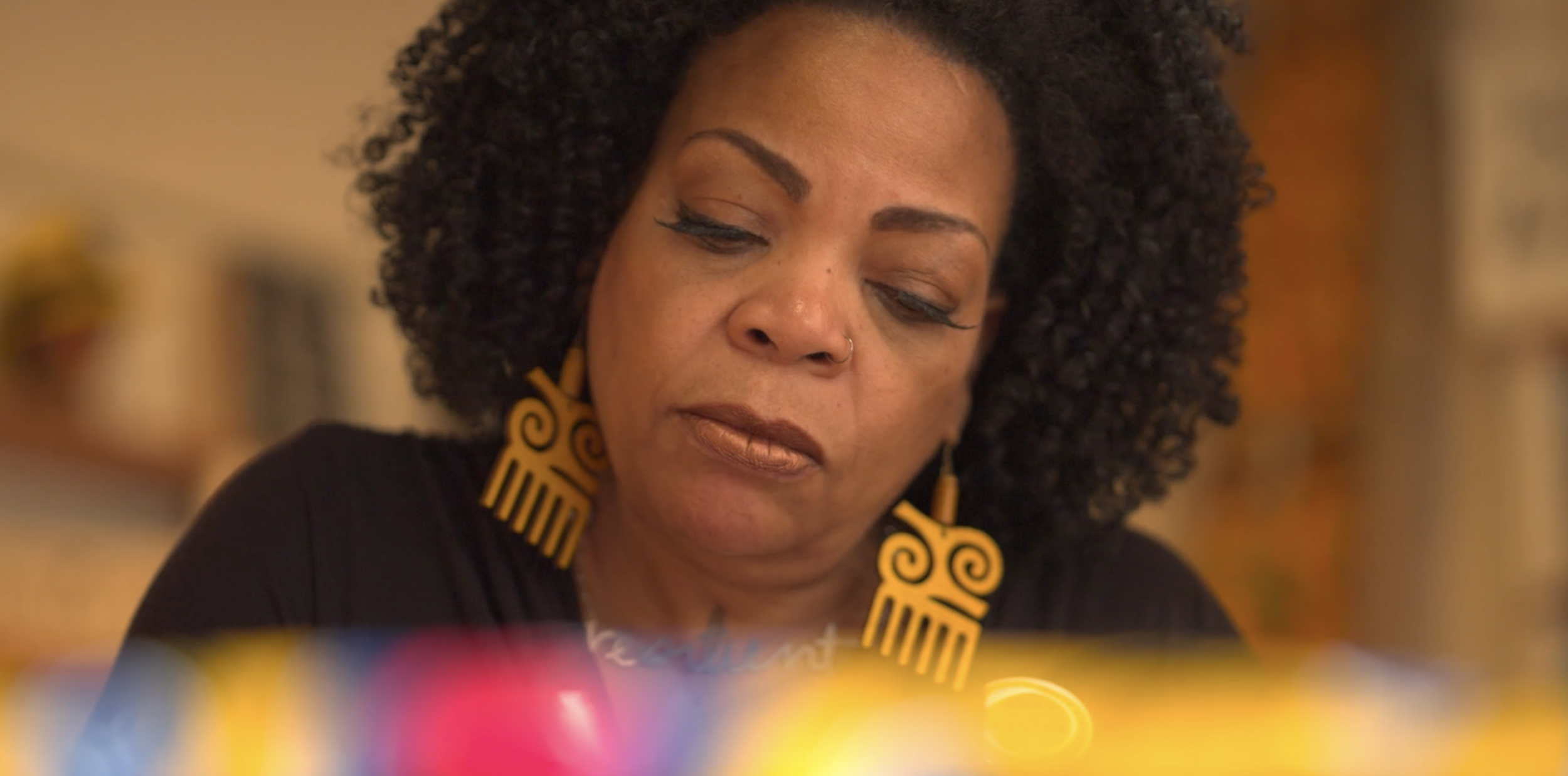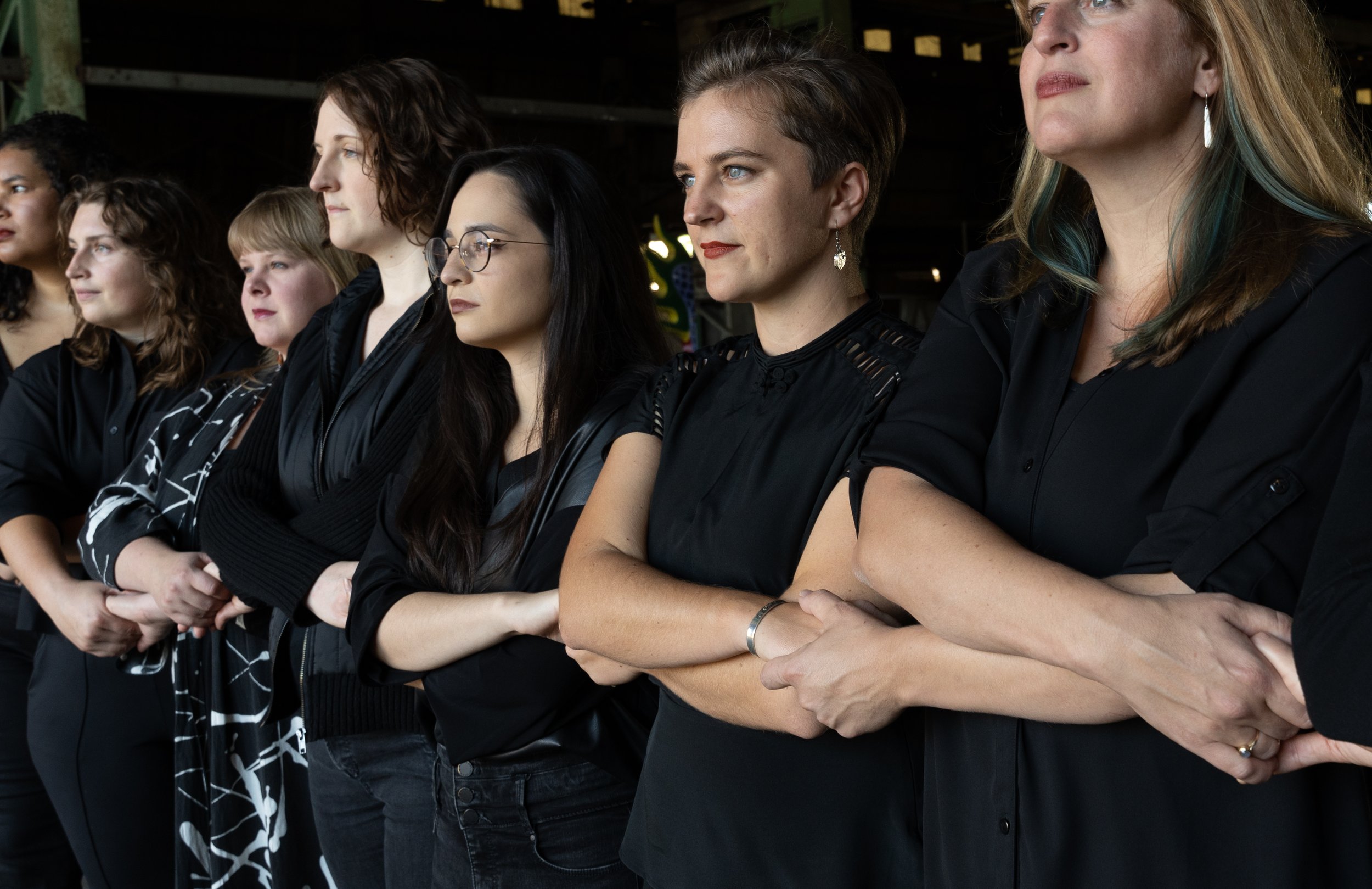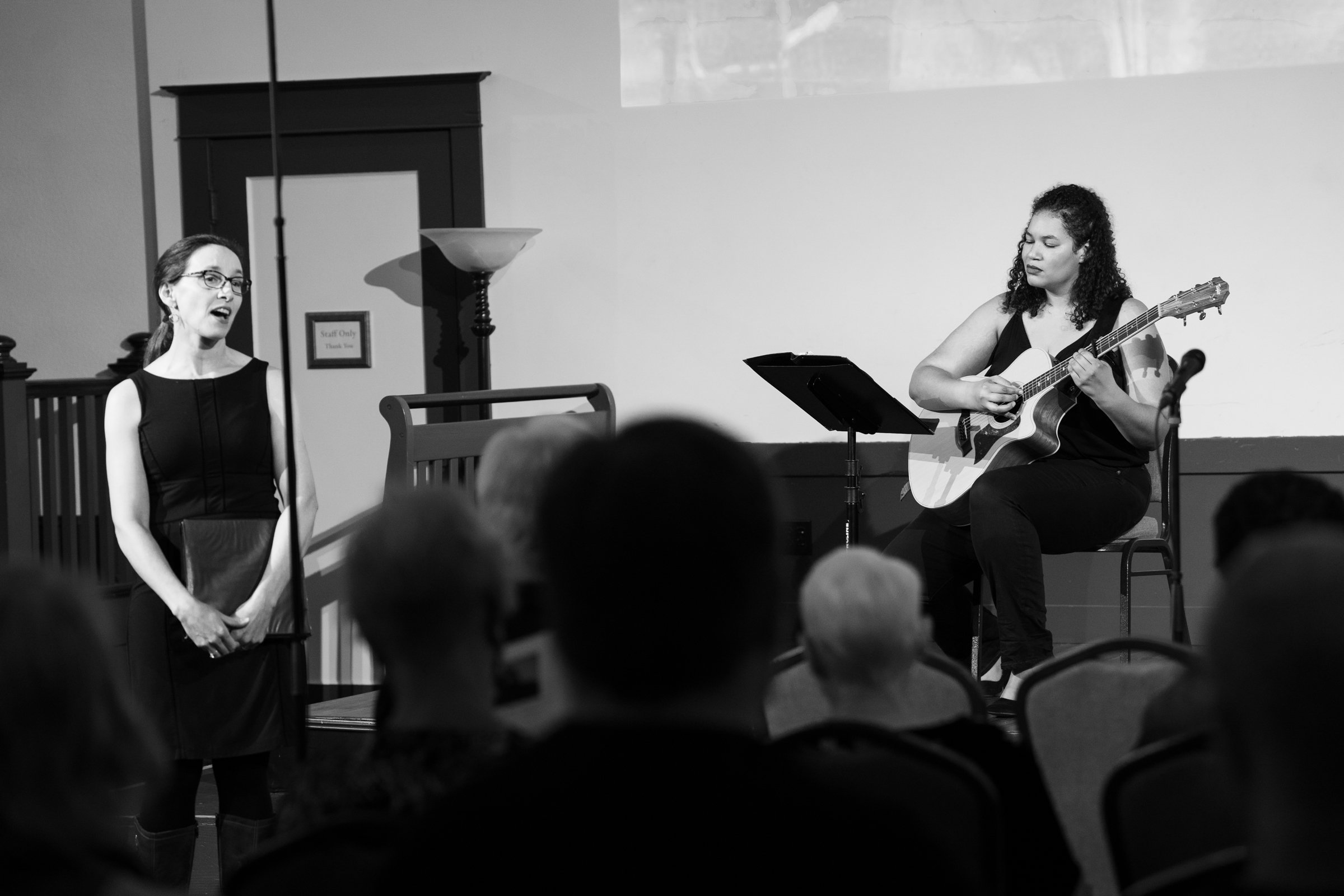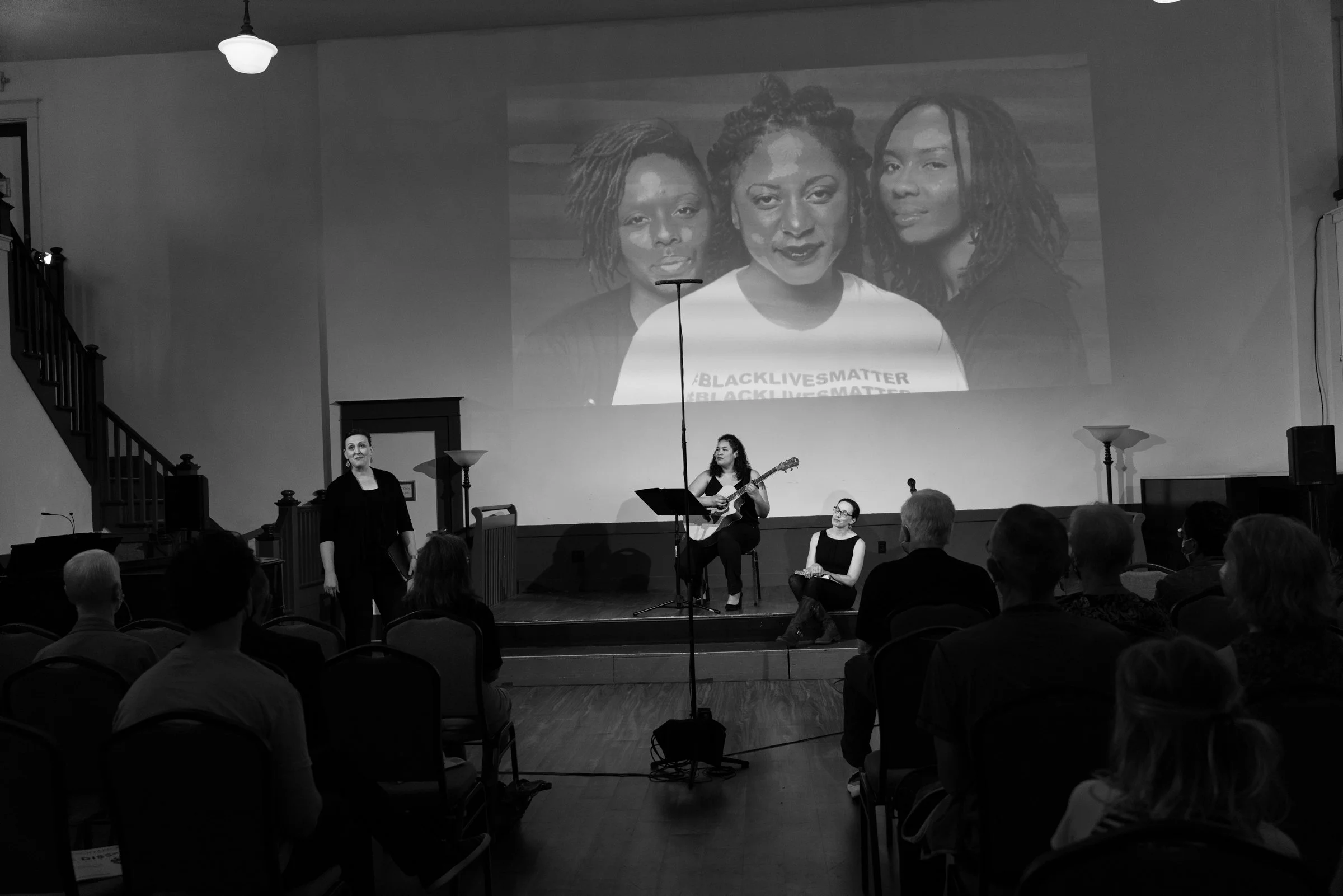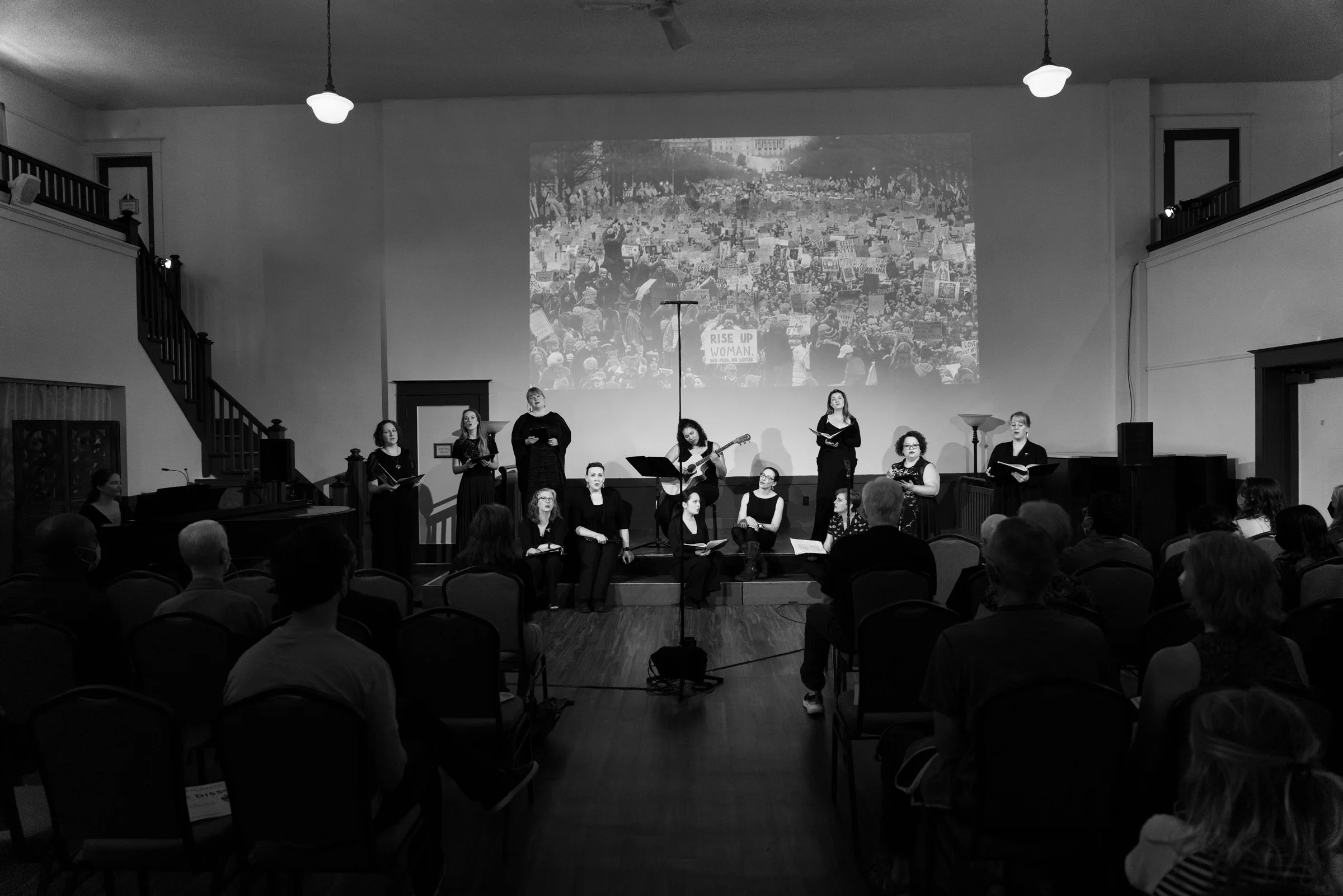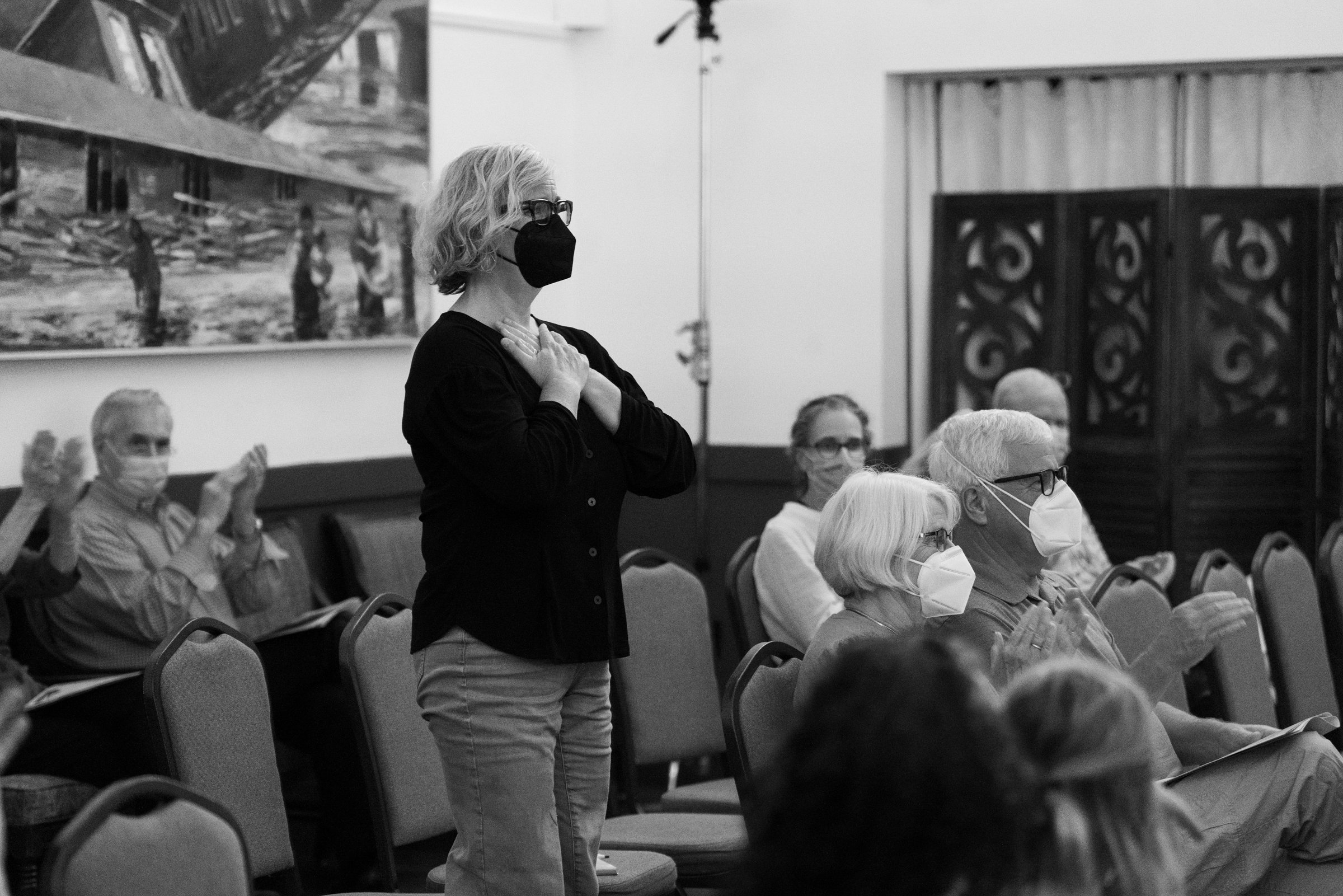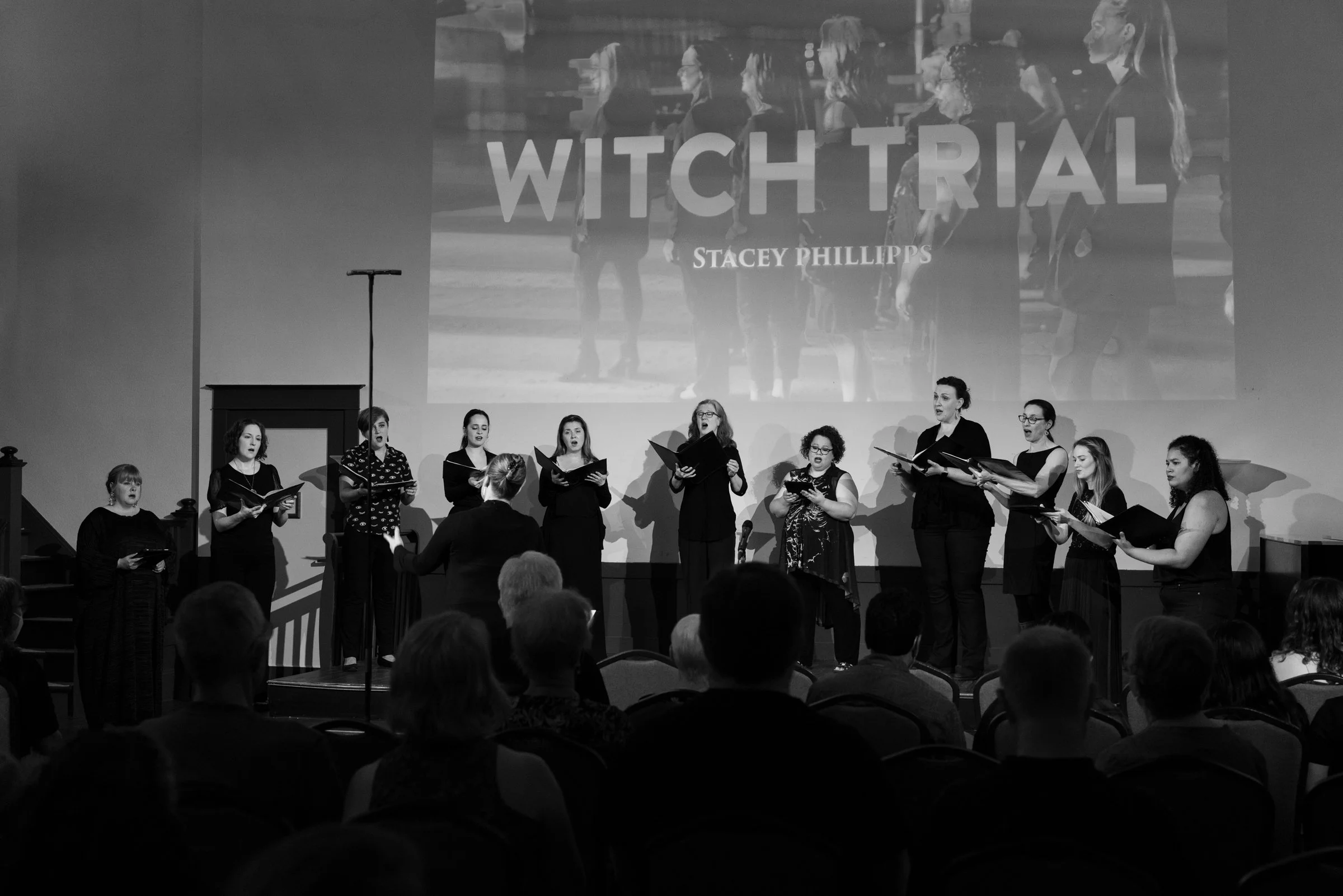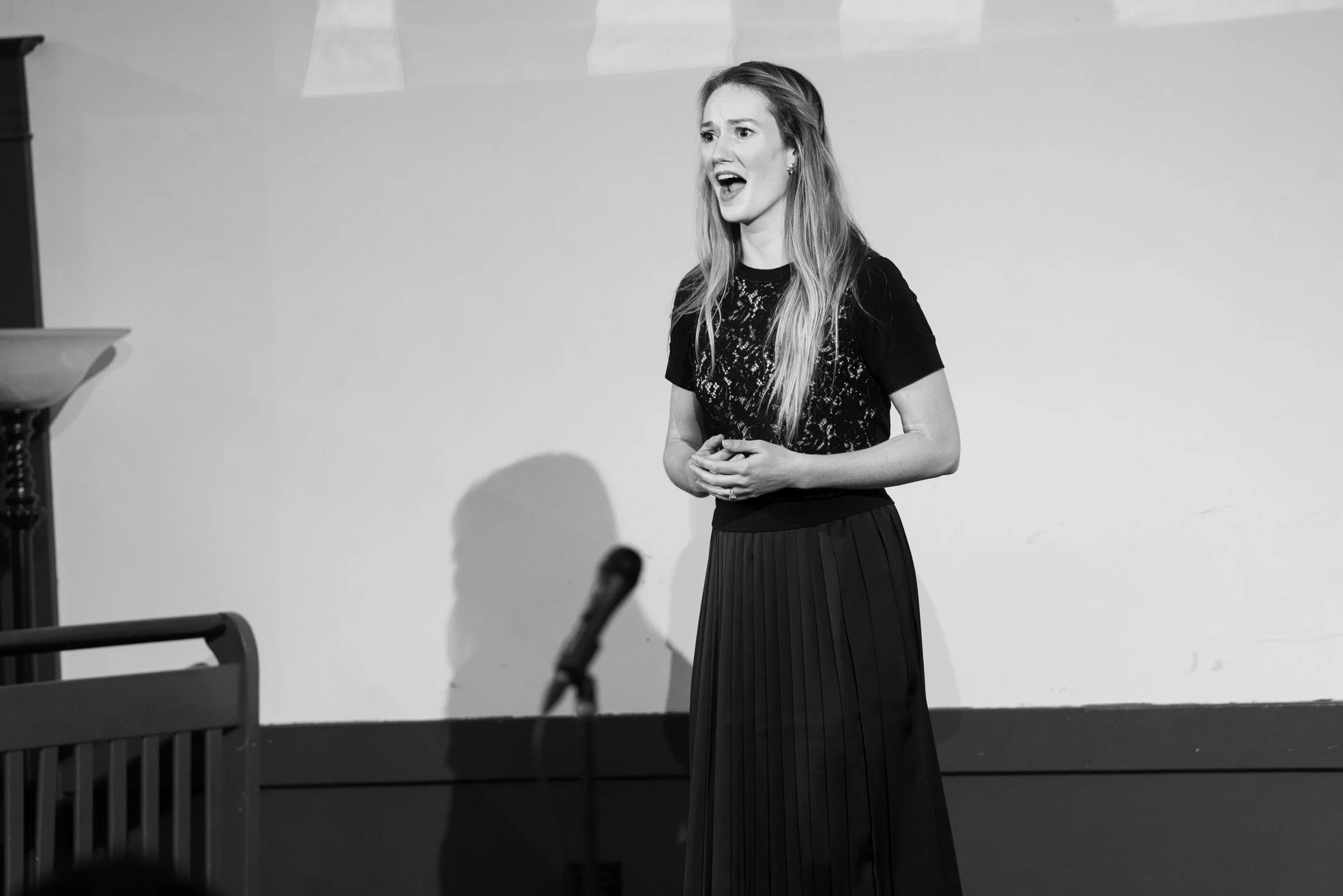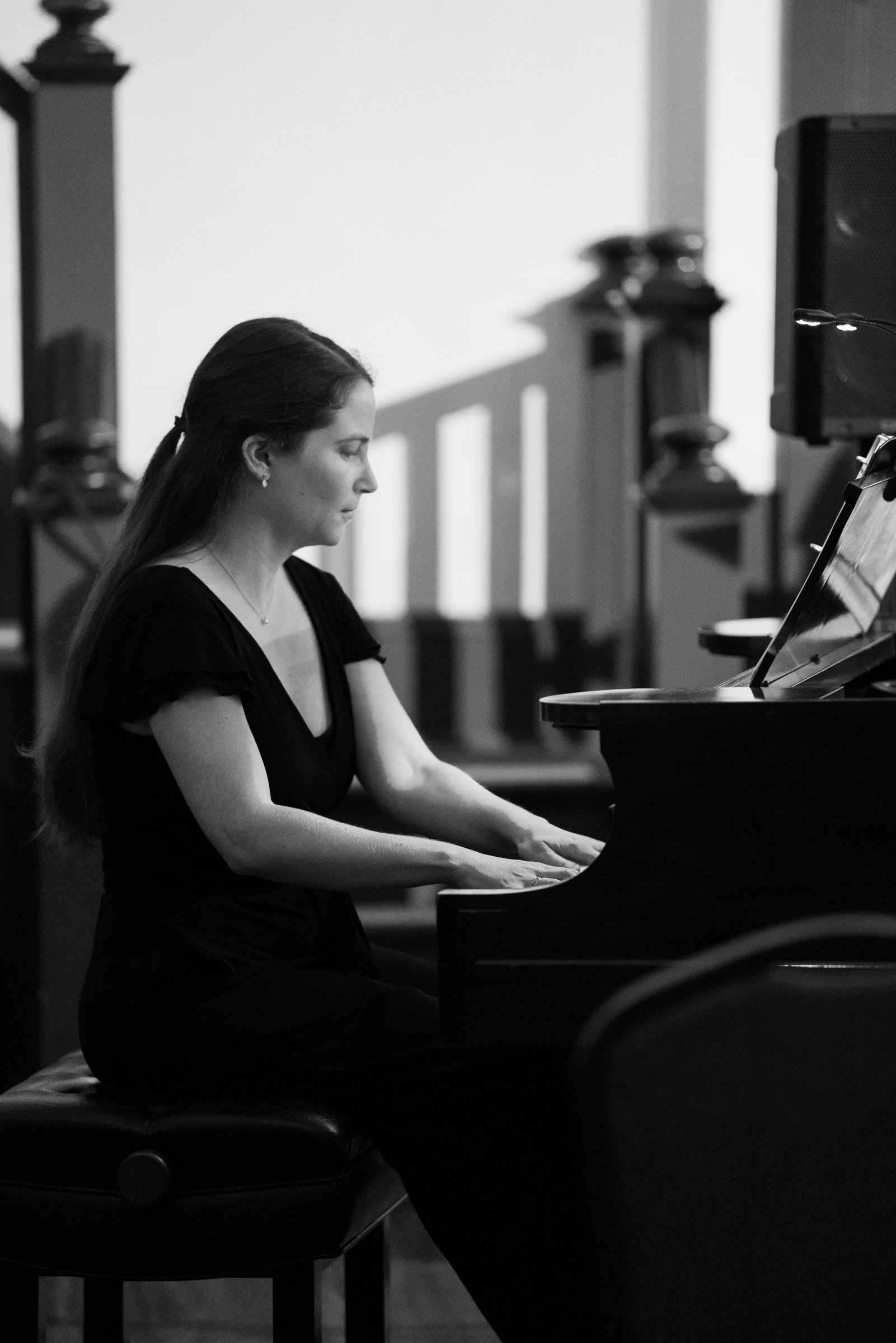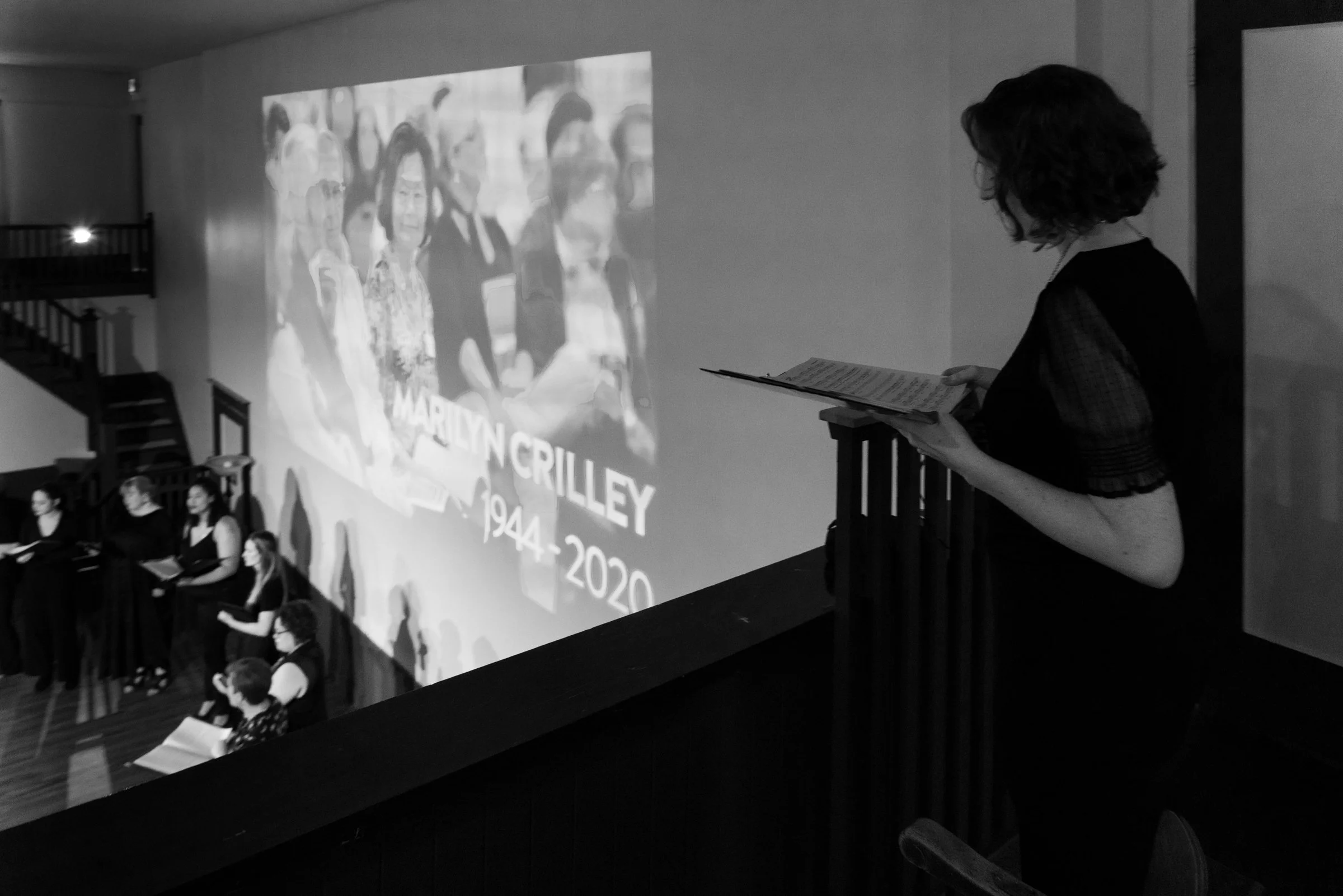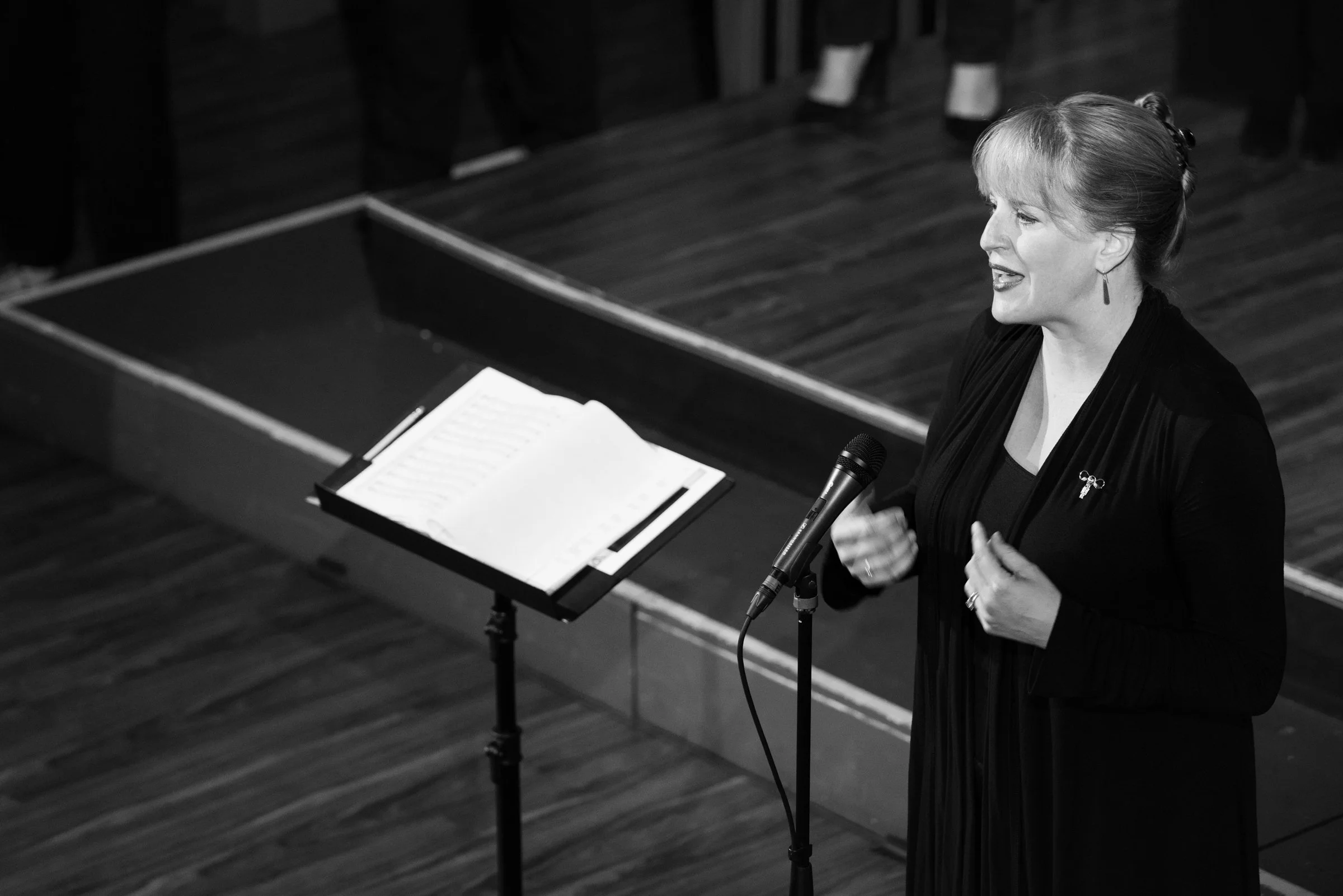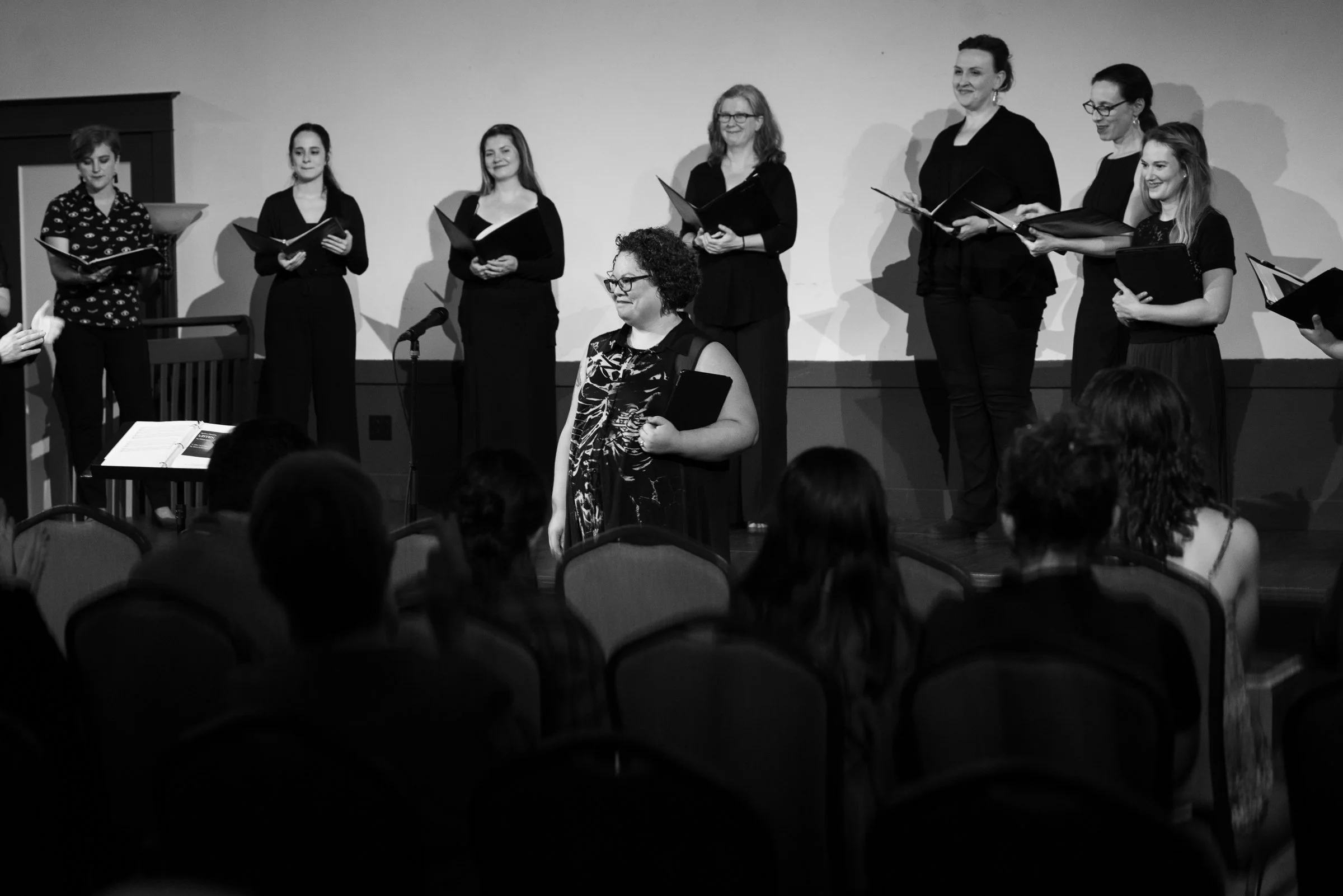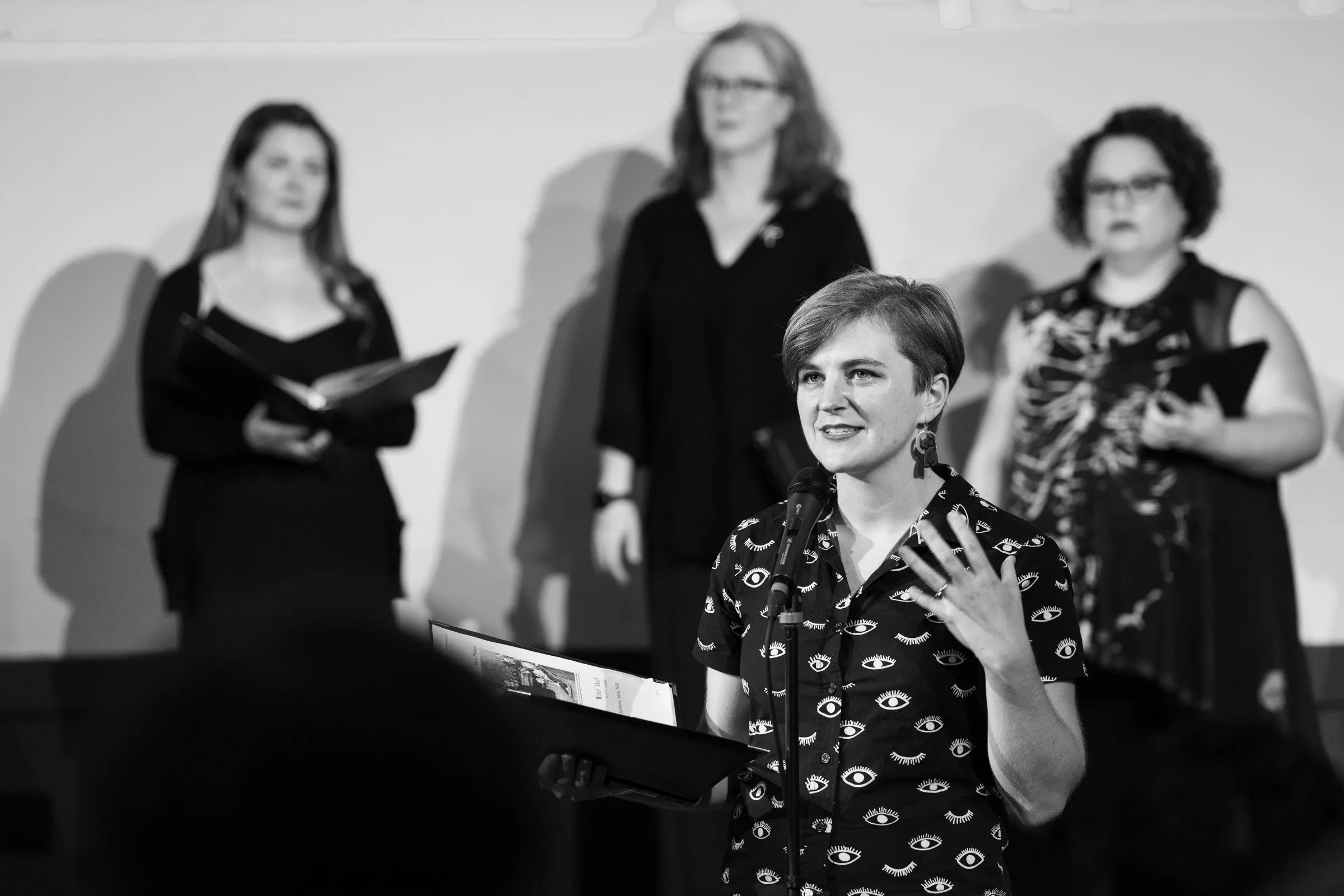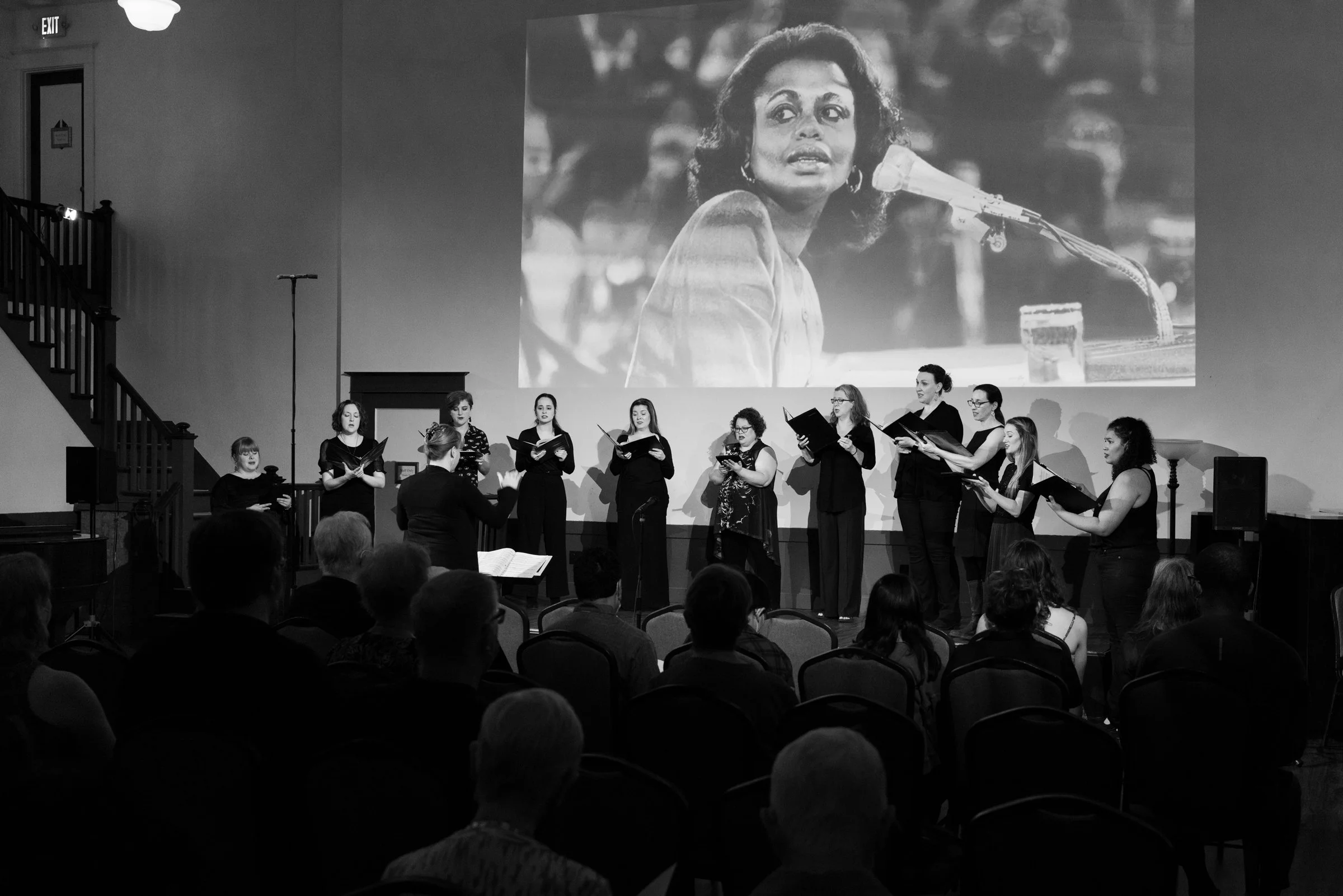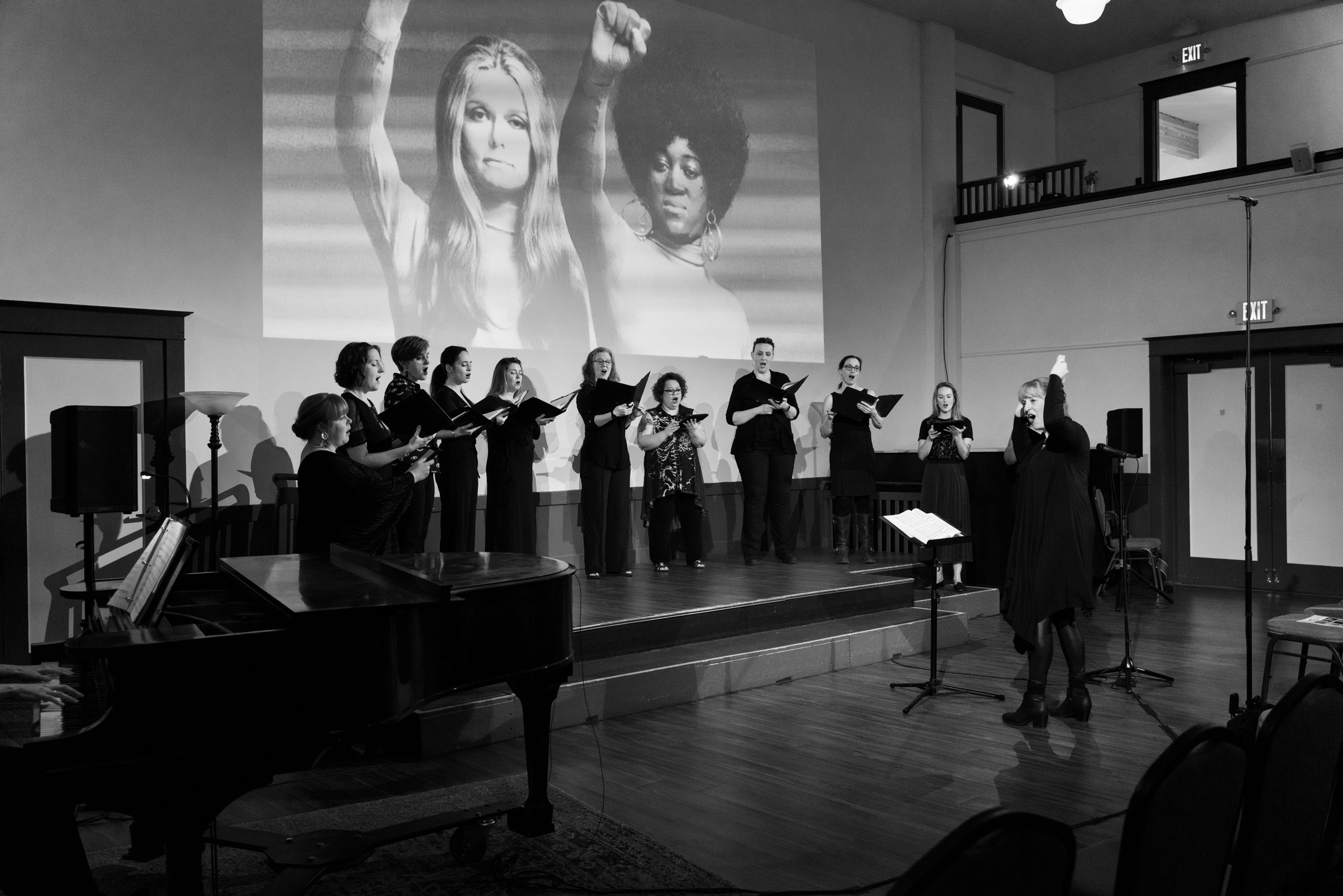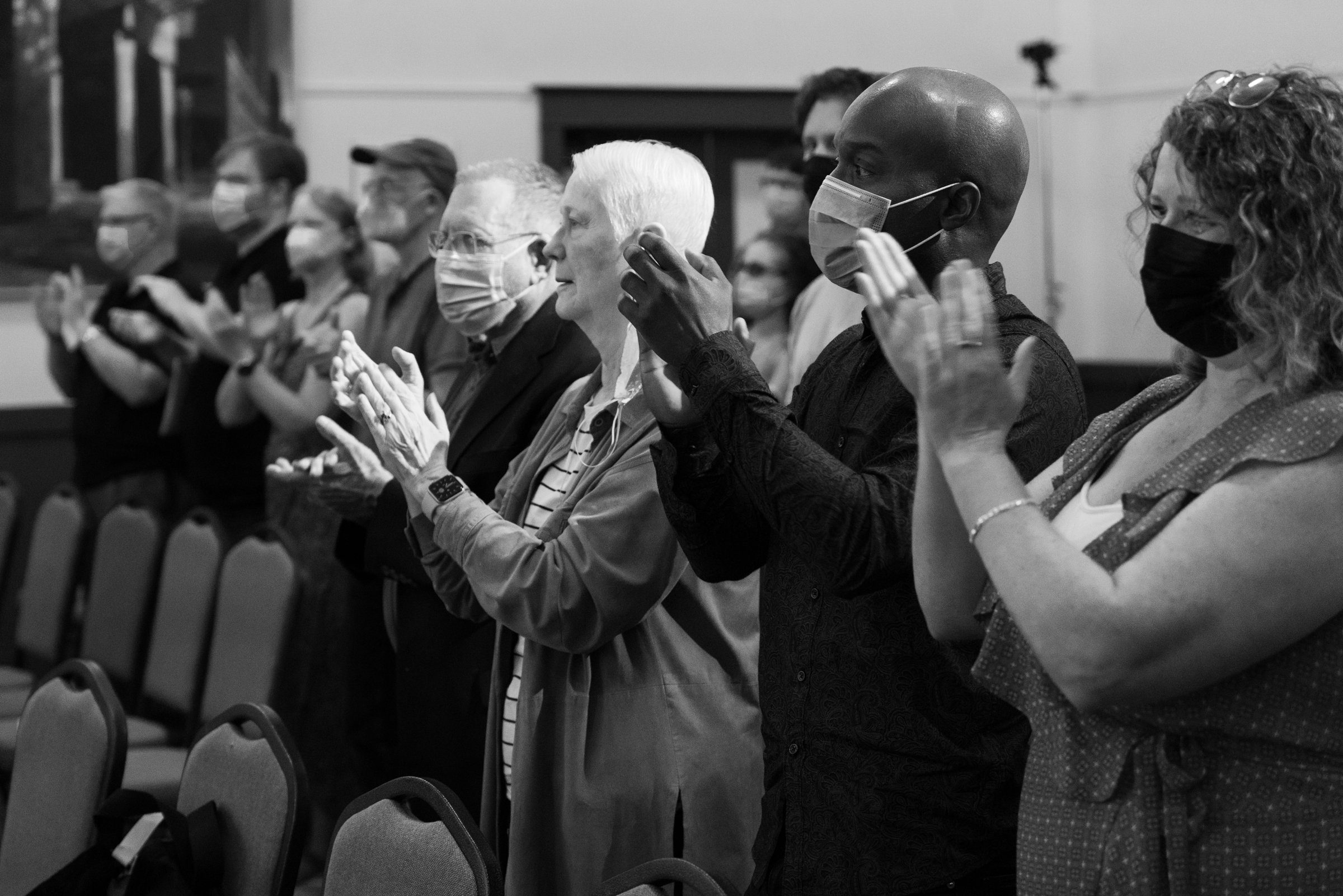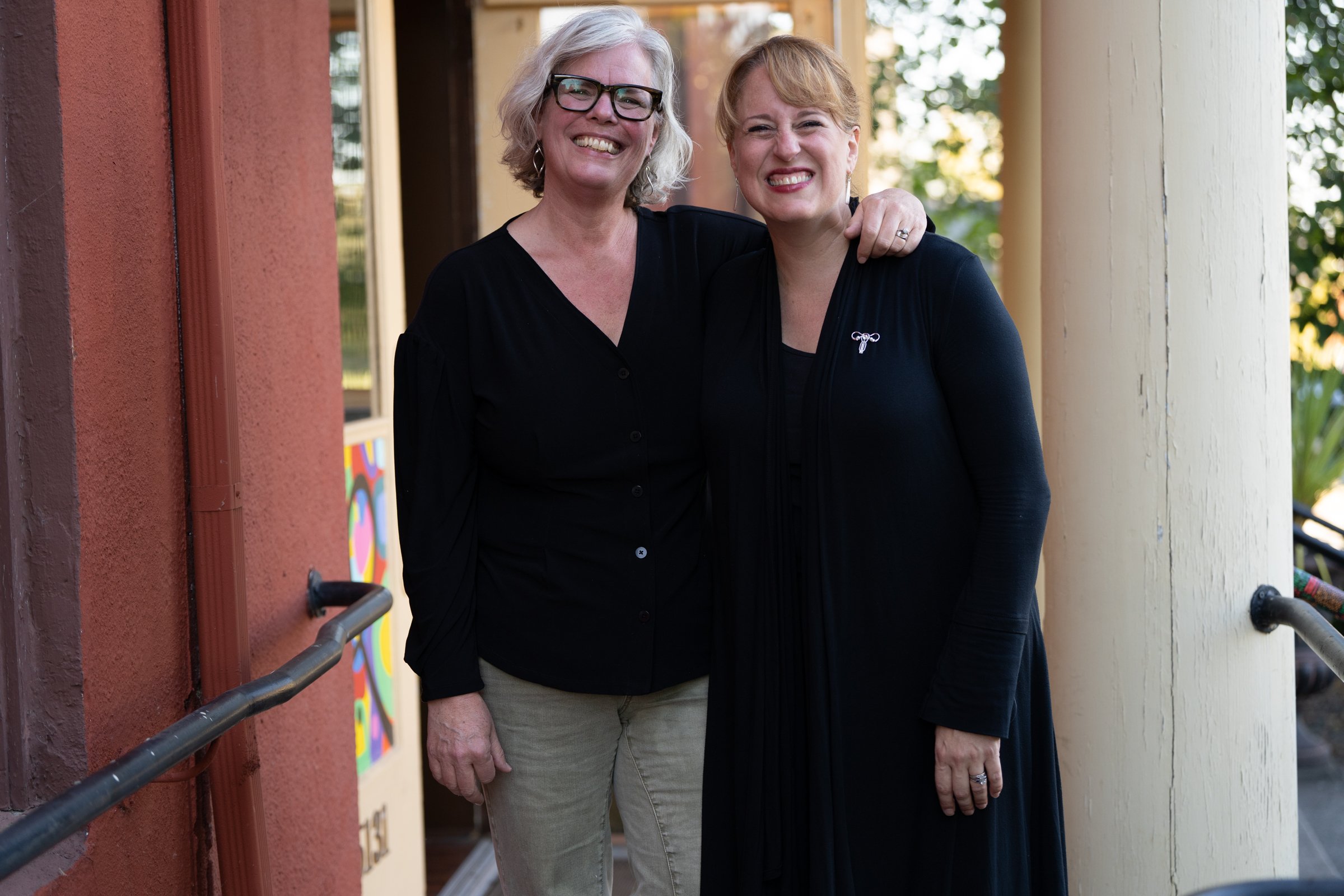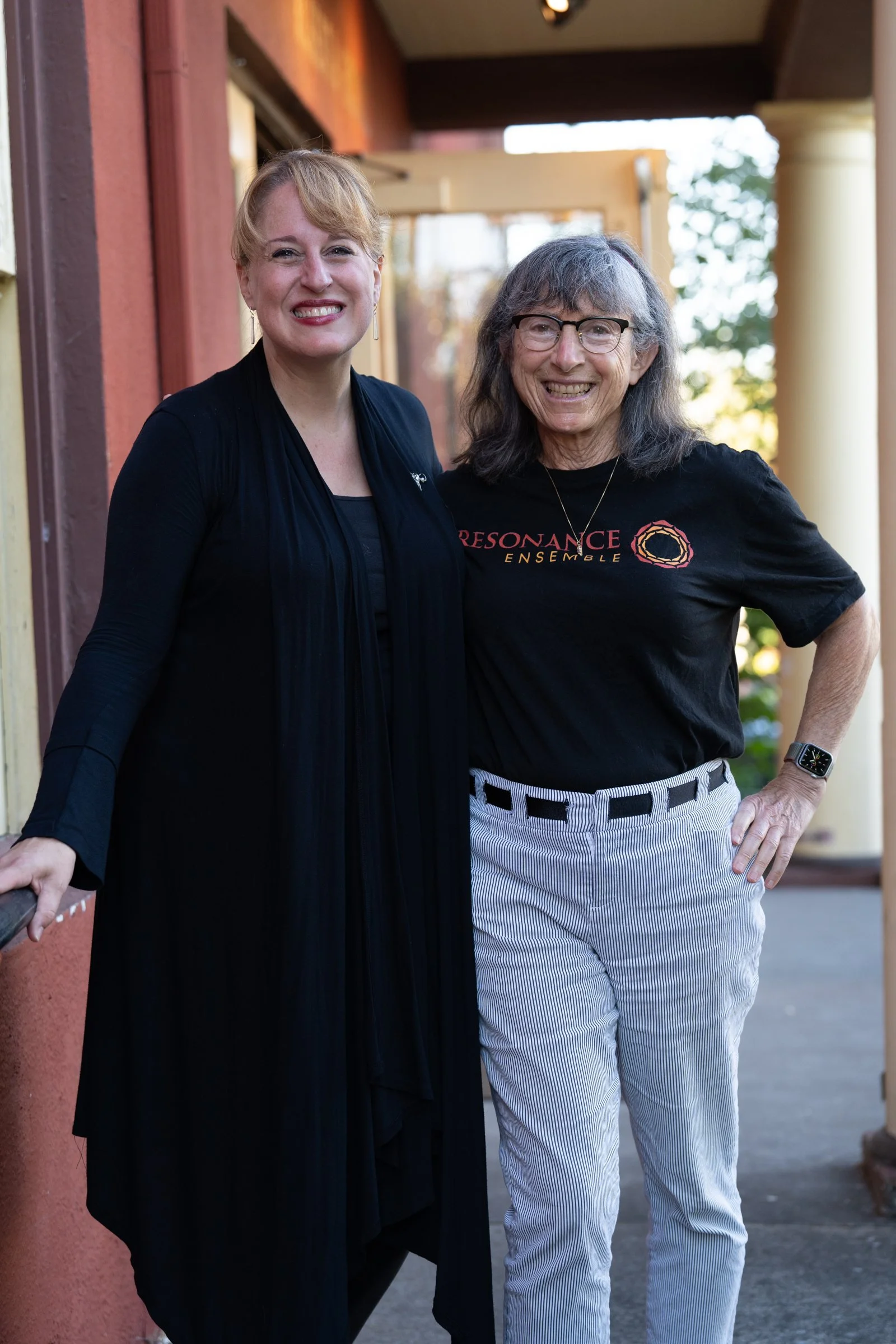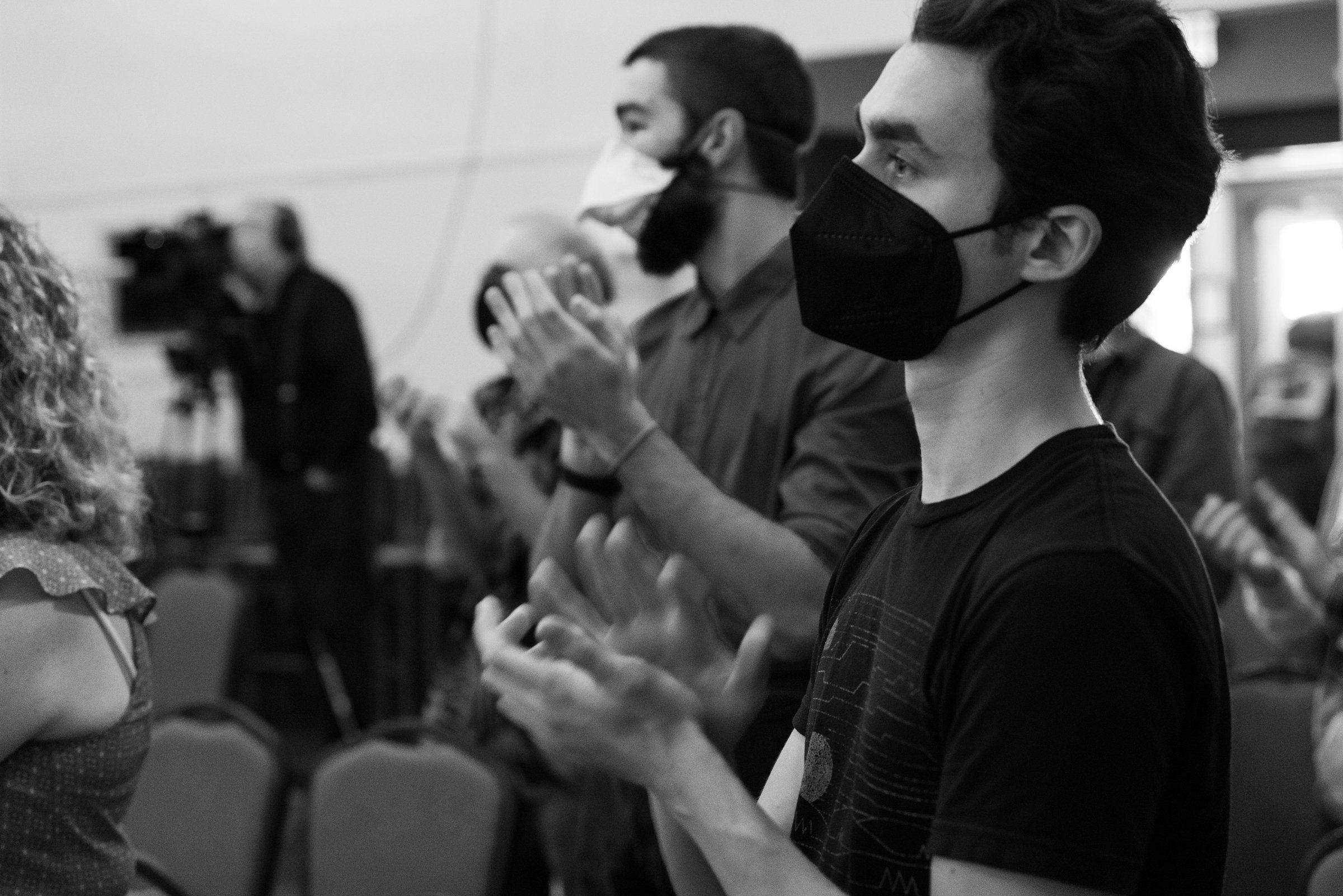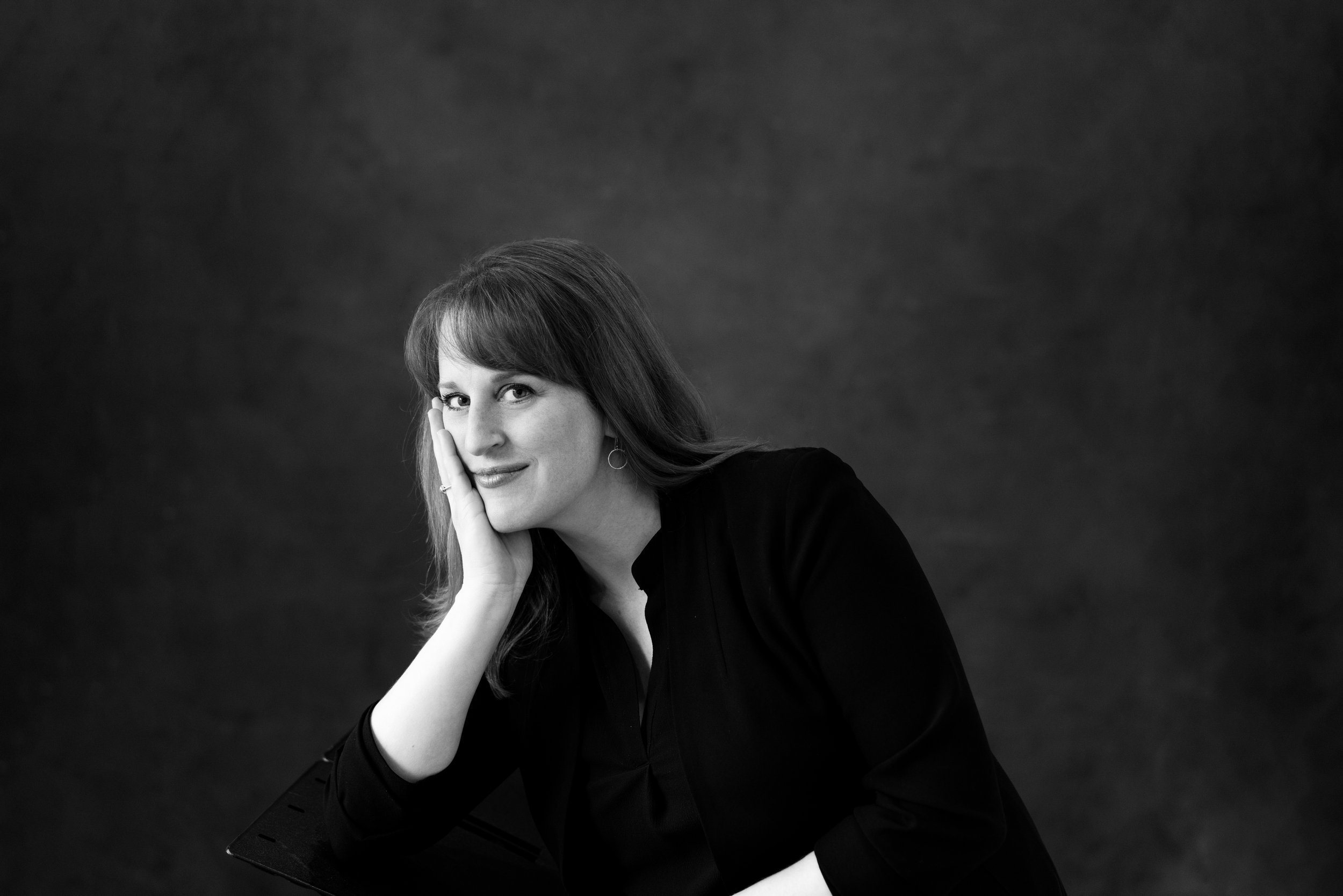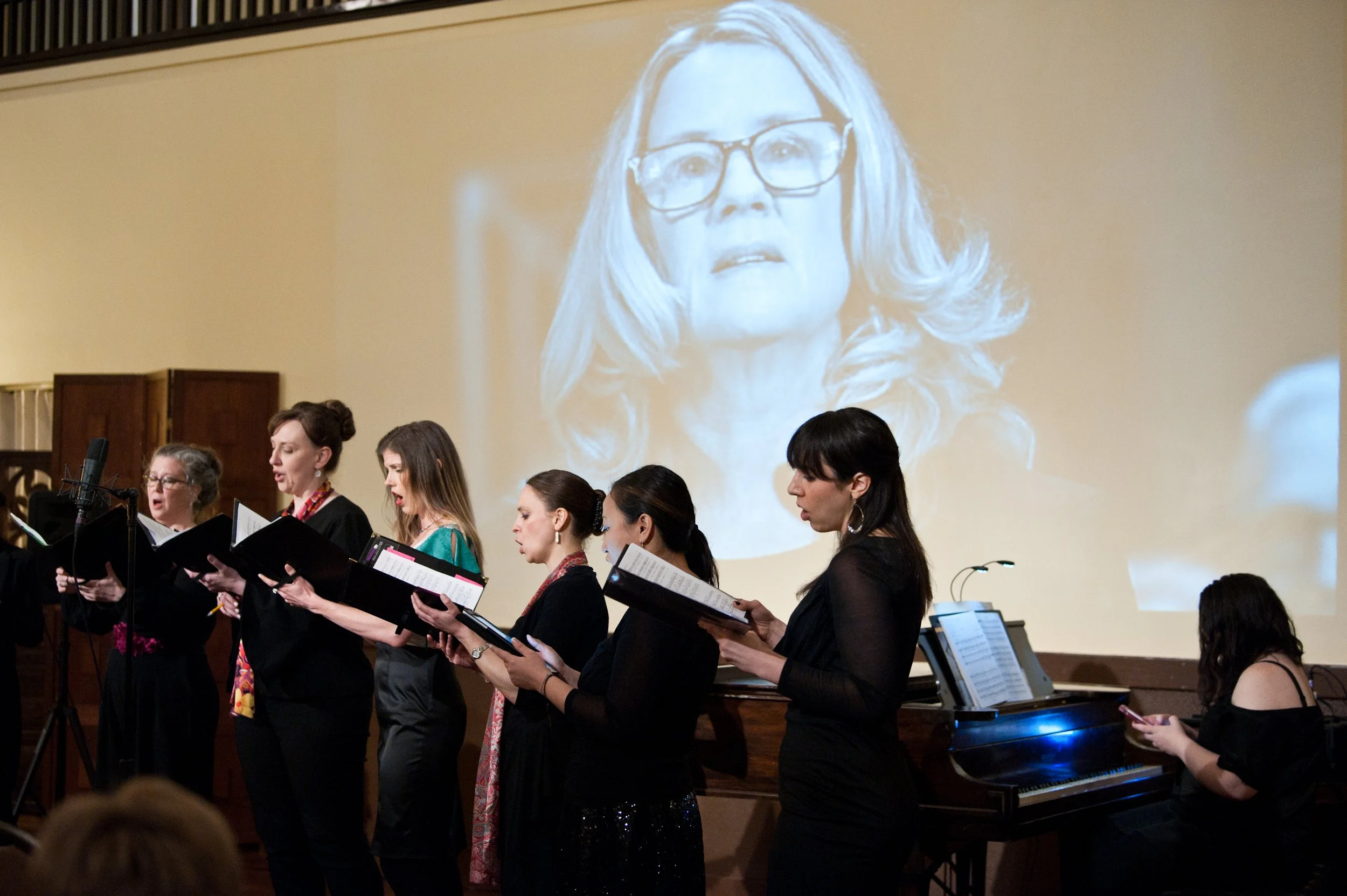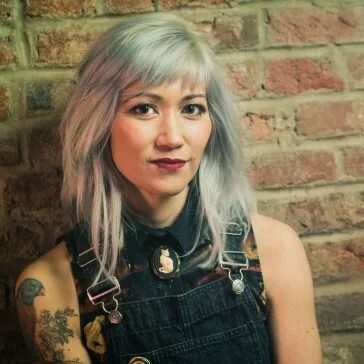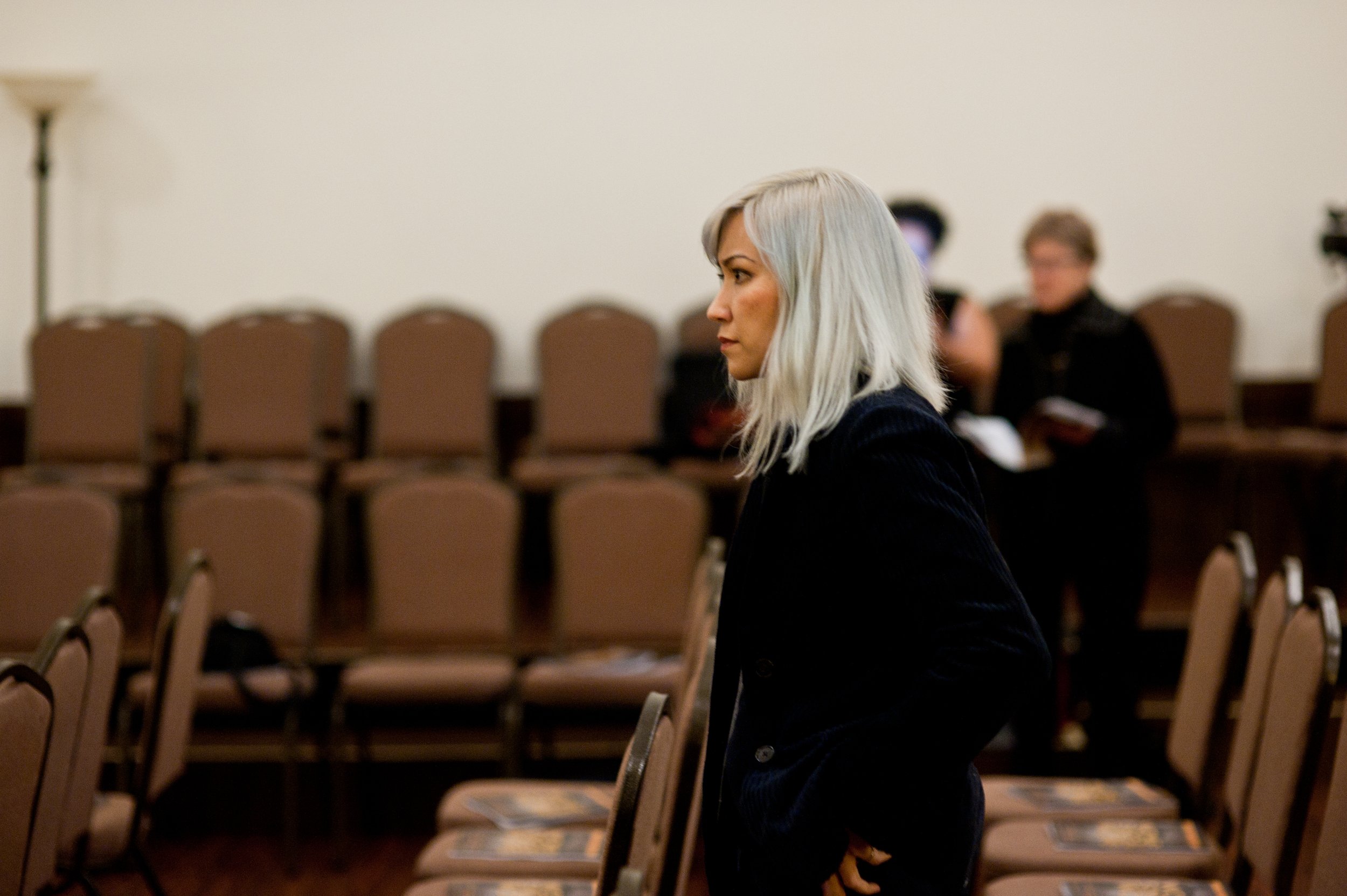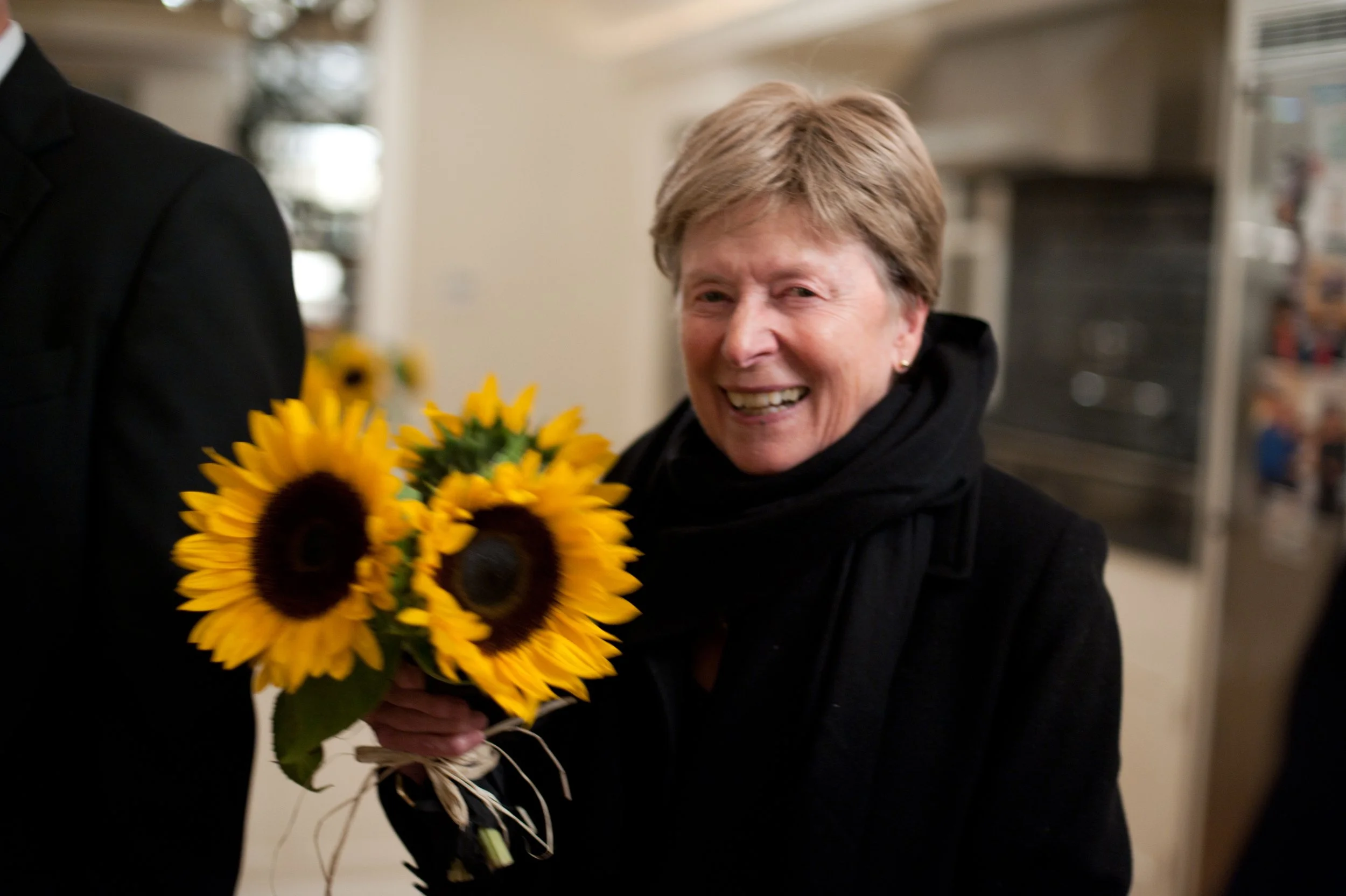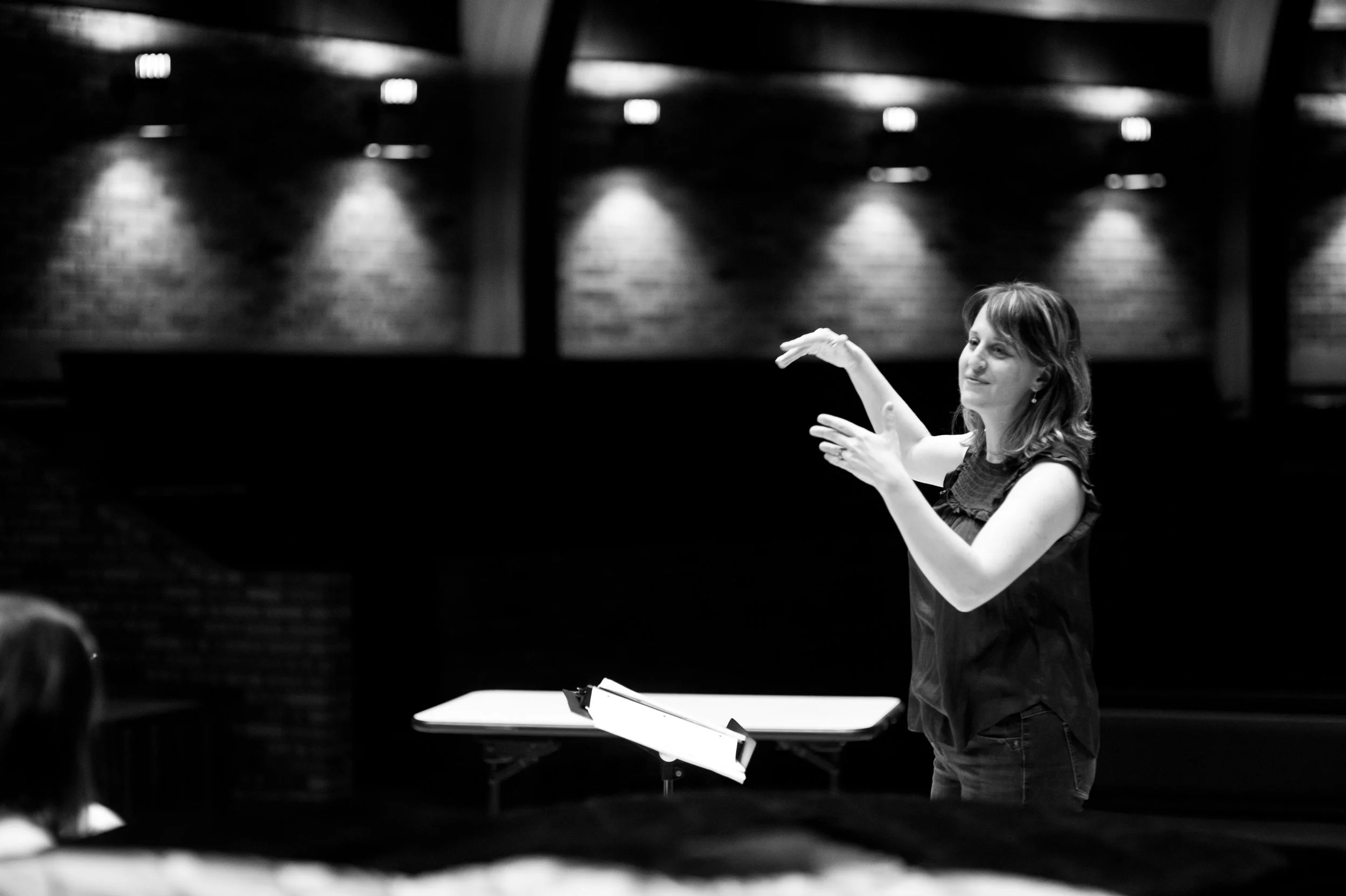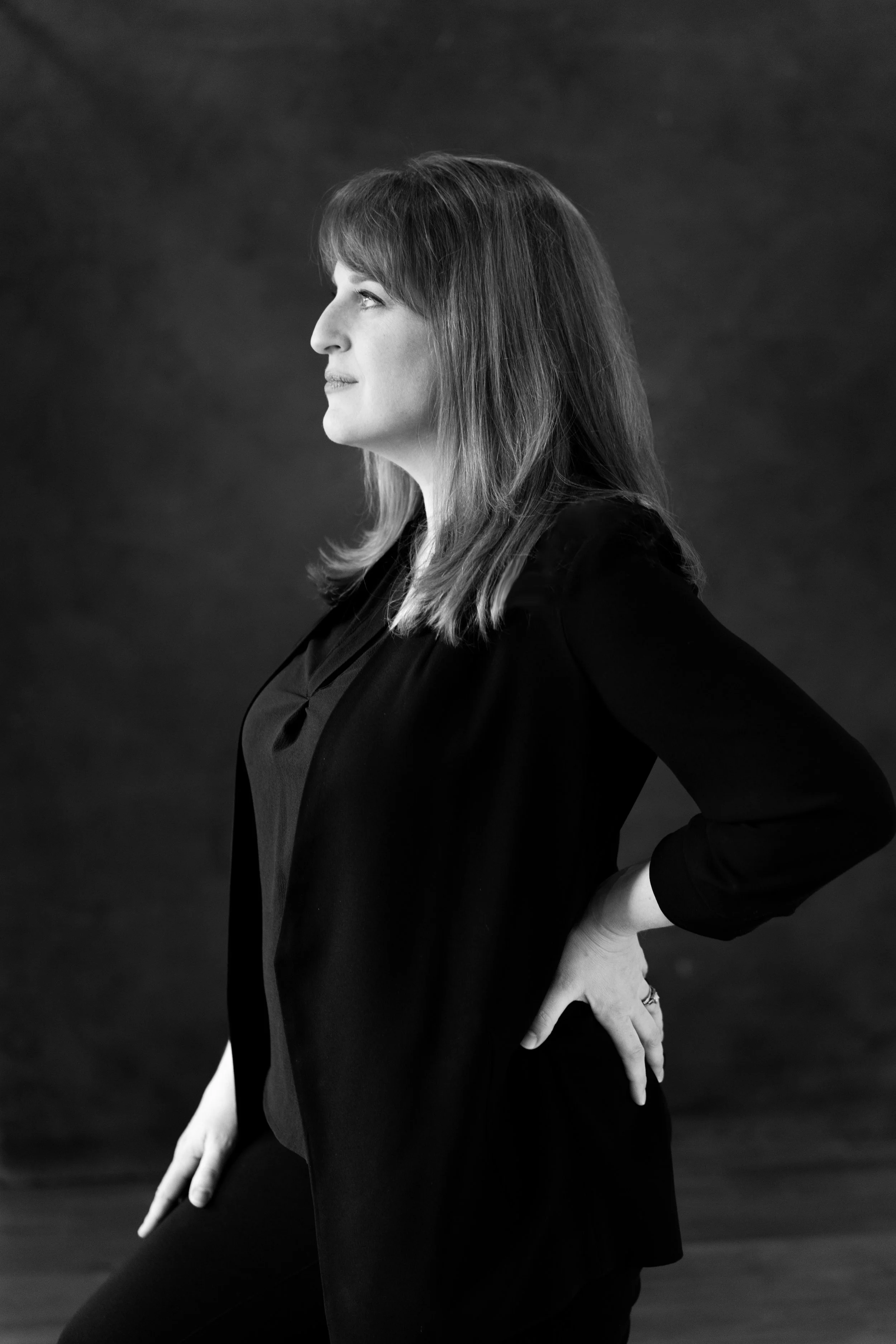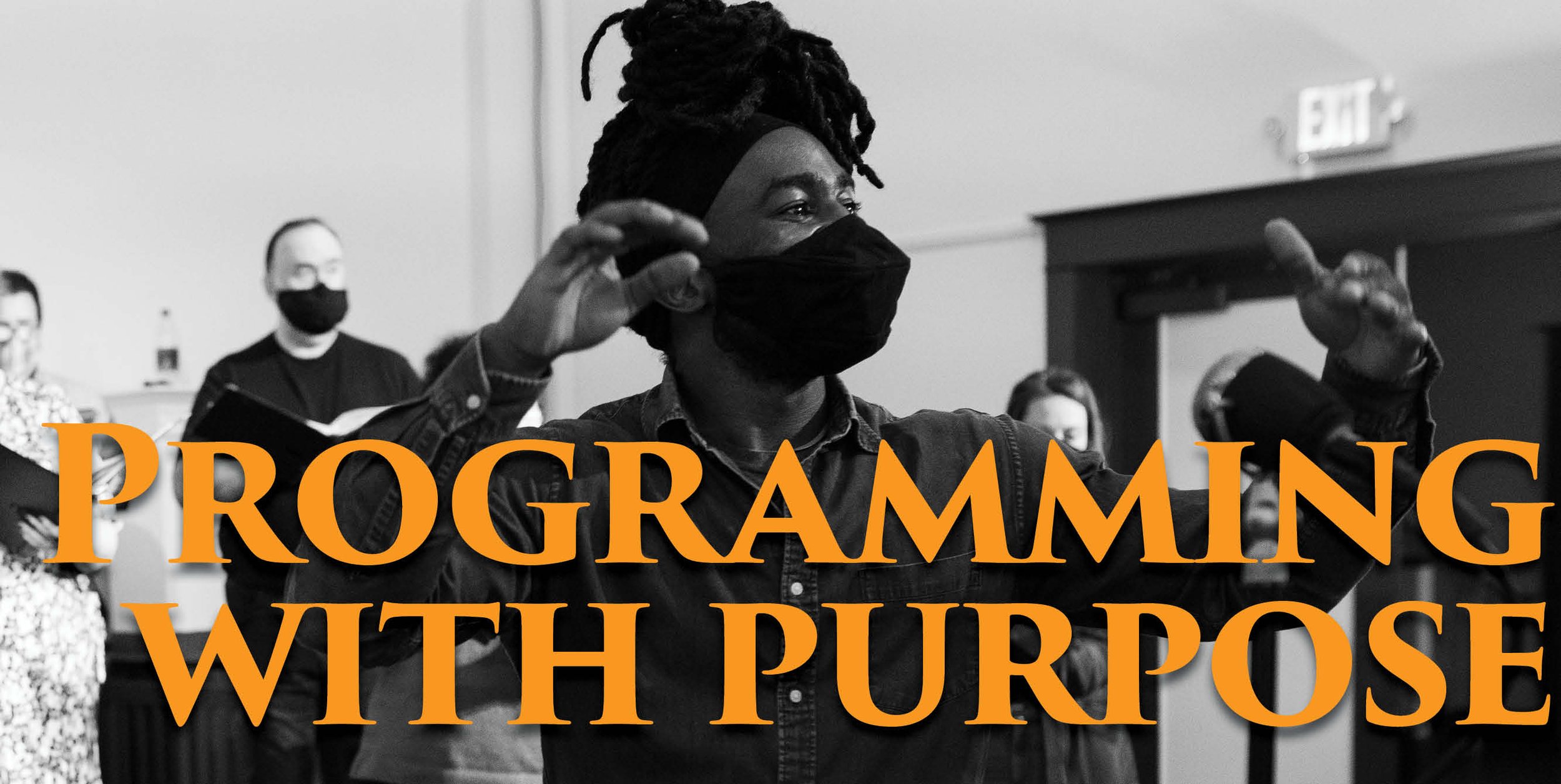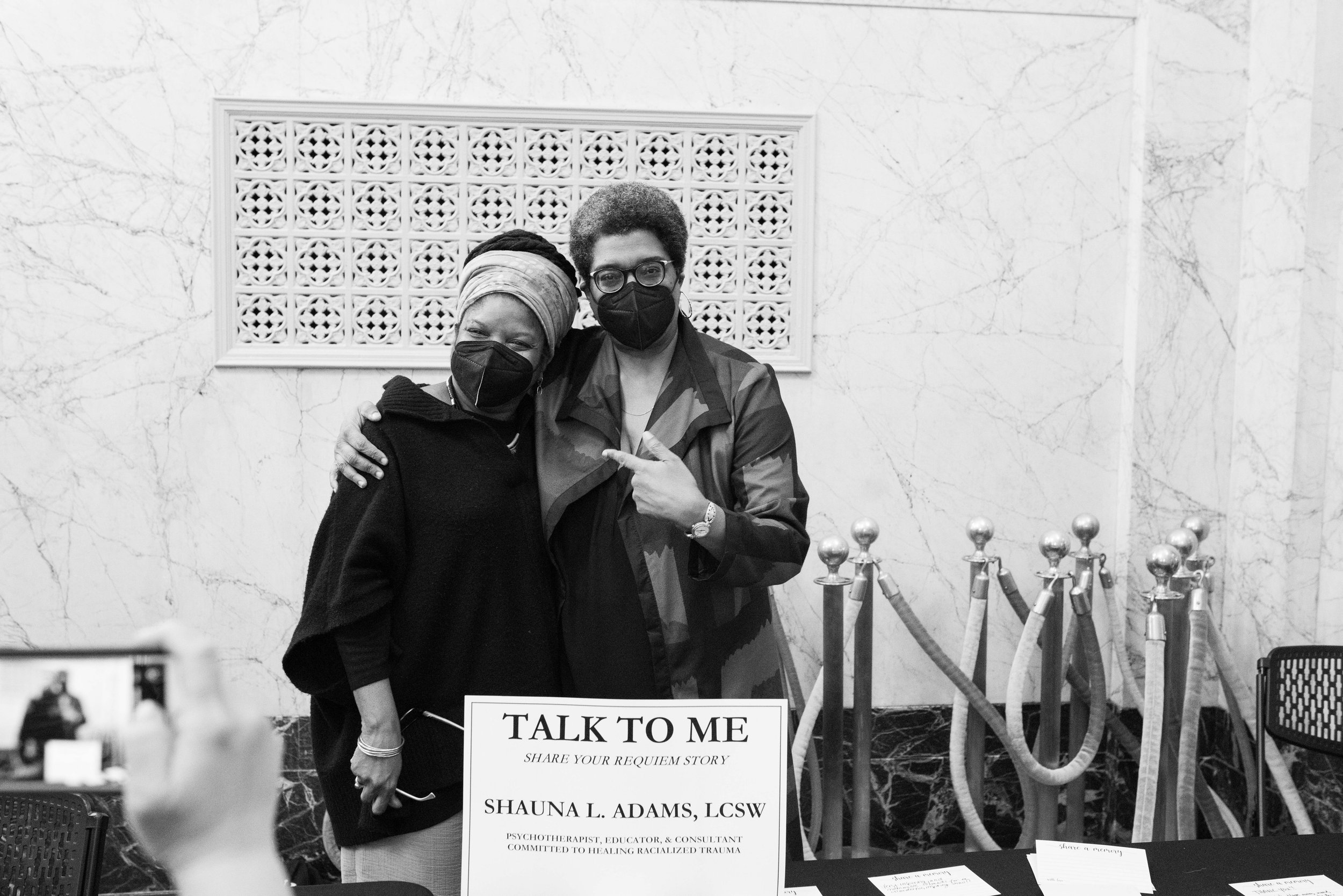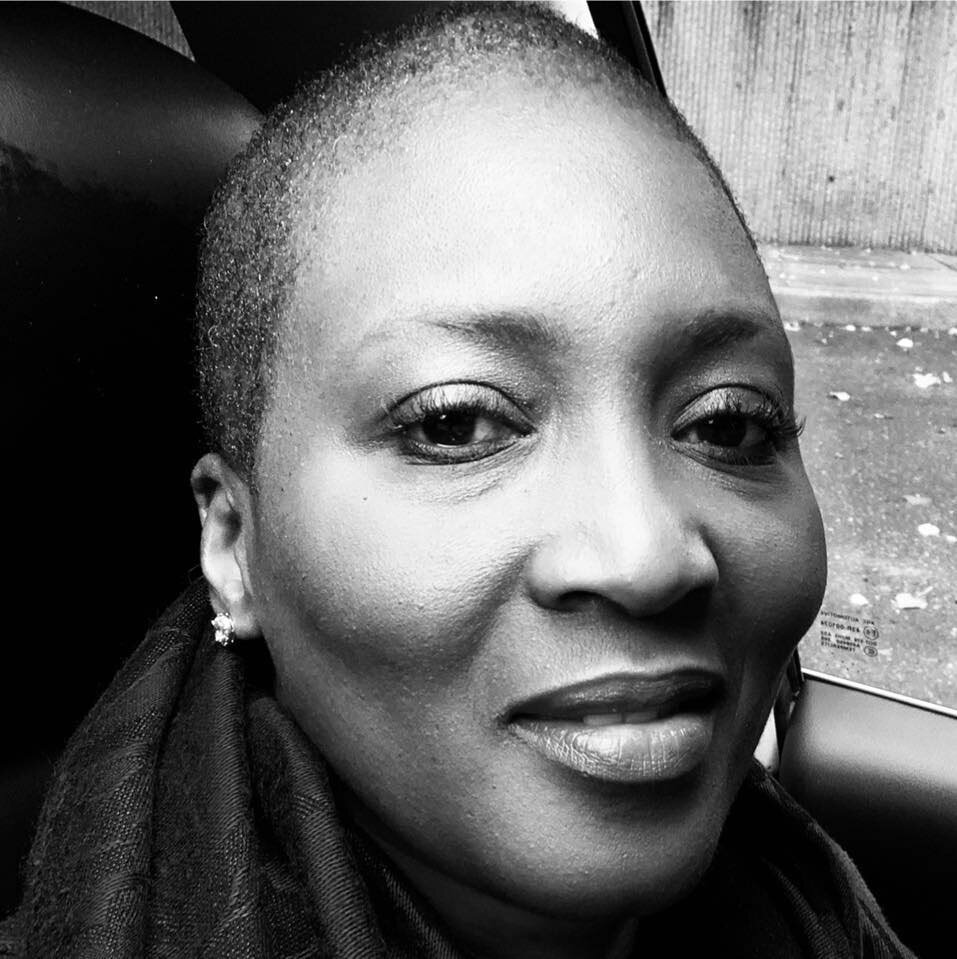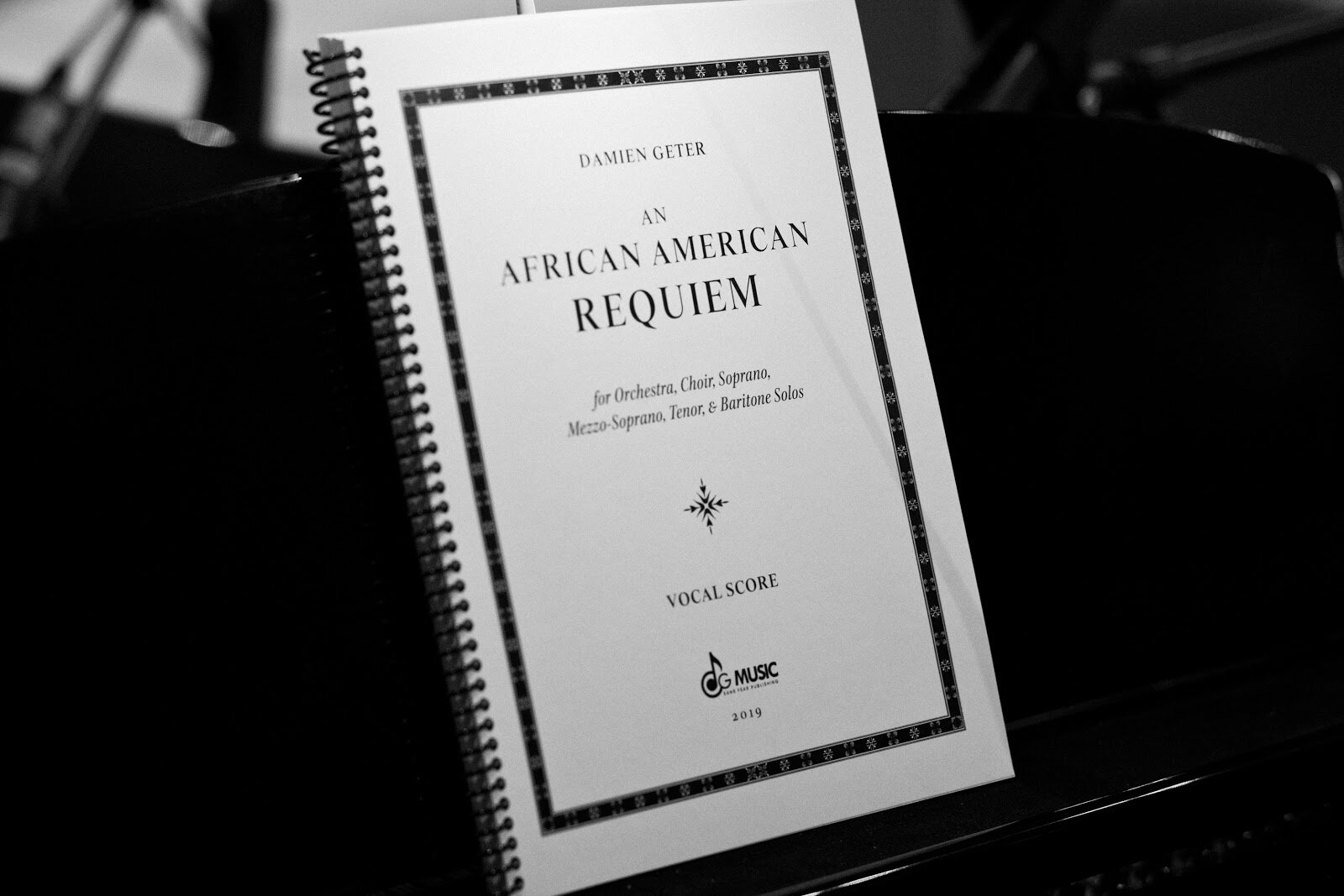AROUND THE REQUIEM FILM SCREENING IS POSTPONED TO APRIL 21, 2023
Due to illness, Resonance Ensemble and Alberta House have decided to postpone the screening for Around the Requiem.
Around the Requiem will now premiere Friday, April 21, 2023. The live event will include a panel discussion featuring Katherine FitzGibbon, Artistic Director for Resonance Ensmeble, Damien Geter, composer and Artistic Advisor for Resonance, Dr. S. Renee Mitchell, poet and moderator on the film, and Vin Shambry, Artistic Director, Alberta House.
Details to follow as we get closer to the event.
"AROUND THE REQUIEM" — A Film Premiere at Alberta House
On Thursday, November 17, 2022, Resonance Ensemble and Alberta House invite you to celebrate the premiere of the short film, “Around the Requiem,” featuring an intimate conversation with the artists and members of the creative team from last spring’s An African American Requiem.
About the Film: Commissioned by Resonance Ensemble and produced by Oh! Creative, the film was made two days before the world premiere of An African American Requiem. In the film, poet and collaborator Dr. S. Renee Mitchell moderates a conversation with composer Damien Geter; conductor William Eddins; soloists Brandie Sutton, Karmesha Peake, Bernard Holcomb, and Kenneth Overton; and Onry, a baritone from the African American Requiem choir. The group discusses the significance of Geter’s work, their experiences as Black artists in classical music, their struggles, and their joy.
Dr. S. Renee Mitchell, seen here in an episode featuring her “My Requiem Story”
Resonance created a series of videos to support the premiere of An African American Requiem, from the deeply personal My Requiem Story series to their curriculum that has reached hundreds of public school students (and counting!). “Around the Requiem” is the final video of the series.
About the Event: A reception will kick off the event at 6:00 PM, with small bites and a no-host bar, and the screening begins at 6:30 PM. Resonance Ensemble’s Artistic Director Dr. Katherine FitzGibbon and Alberta House’s Artistic Director Vin Shambry will introduce the 40-minute film. After the screening, all are welcome to stay for a conversation with Mitchell, FitzGibbon, and Shambry.
Vin Shambry holds his AAR tickets, which he keeps on his desk to remind him of the experience.
About the Partnership between Resonance Ensemble and Alberta House: Resonance Ensemble is an ensemble in residence at Alberta House, and their missions and histories have a great deal in common. Vin Shambry notes, “My work with Resonance goes back a long time. From performing with them, to collaborating to make the Portland arts community a more radically inclusive place, to being profoundly moved by this spring’s African American Requiem, it is important to me that this group’s voice is heard.”
Shambry continues, “When I saw An African American Requiem last Spring, it moved me to my core. I even keep the tickets on my desk to remind me of that experience. And that’s just one example of why I love Resonance. This superpower of using art to remind us of our soul is the reason I do the work I do at Alberta House and why we are proud partners with Resonance.”
Donations are welcome; all proceeds will benefit future partnership initiatives between Resonance Ensemble and Alberta House. FitzGibbon adds, “We view this as an opportunity to give thanks for our ongoing partnership with Alberta House and our shared missions of creating art that builds community and promotes meaningful change.”
Reception at 6, welcome and premiere at 6:30
To register for the event click here.
Concert Reflection: We Dissent
All images in this post are by Rachel Hadiashar
On October 1, we kicked off our 14th season with “We Dissent,” a program featuring the treble voices of Resonance Ensemble with music inspired from recent court decisions. The choir revisited works from our 2019 concert “Women Singing Women” and brought new music to the program, creating a space that explored human rights and what it means when our right to choose gets taken away.
Please enjoy highlights from this special program.
“‘We Dissent’ was one of the most moving performances I’ve ever attended.”
From the top
Cecille Elliott opened the show playing guitar and singing, “This is the sound of one voice…”
(“One Voice,” by the Wailin’ Jennys)
Amy Stuart Hunn (left) joins Cecille on stage to add her voice.
Cecily Kiester (far left) arrives to complete the trio.
This is the sound of all of us.
Composer Stacey Philipps in the audience
We were thrilled to have composer Stacey Philipps join us for a performance of her powerful work, “Witch Trial,” featuring Emma Lynn Abrams as soloist.
Composer Mari Esabel Valverde in our hearts
When the Dust Settles by composer Mari Esabel Valverde (who visited Resonance in Portland just this past spring) offered a lush and celebratory work that featured the full range of the ensemble’s altos and sopranos, supported by a gorgeous piano accompaniment.
Poignant solo moments
Mezzo Sarah Beaty received rousing applause for her performance of “Three Words” from Laura Kaminsky’s opera As One. She was accompanied by pianist Hannah Brewer, who performed on several other pieces with Resonance Ensemble for this concert.
Soloist Sarah Beaty
Pianist Hannah Brewer
Remembering those we’ve lost
The first half closed with Ysaye Barnwell’s Wanting Memories, a song about yearning for those who have died and the wisdom they imparted. Accompanied by pictures of women who were lost over the last two years —including Resonance supporters Marilyn Crilley and Dinah Dodds — this moving tribute left a good portion of our audience (and staff, and volunteers, and performers…) in tears.
Resonance performs Wanting Memories by Ysaye Barnwell, with some singers singing in the balcony.
Personal testimony
Many of the performers, including Artistic Director Katherine FitzGibbon, shared vulnerable stories of pregnancy decisions, celebrating and defending bodily autonomy, and speaking truth to power.
Soprano Maria Karlin shared her struggles with depression and anxiety and then powered into her mind-blowing arrangement of Suzanne Vega’s Blood Makes Noise.
Performer Emma Lynn Abrams shared context on Stacey Philipps’ work, Witch Trial - including how some of the same stigmas towards self-sufficient women still exist today.
The reprisal of “LISTEN”
The featured reprisal of the 2019 Resonance Ensemble’s commission, LISTEN , was once again an audience favorite. Written by Melissa Dunphy, the work sets excerpts from the testimonies of Anita Hill and Christine Blasey Ford, both of whom shared accounts of sexual harassment and assault by two of the justices who later supported the Dobbs decision to overturn Roe v. Wade earlier this year. It provided yet another sobering reminder of the rights we are still fighting for today—and the persecution many face by speaking their truth.
The work continues, keeping hope alive
Jocelyn Hagen’s inspiring piece Starting Now, was the perfect way to end the day.
It reminded us that together, we continue to create a world where equality, agency, and bodily autonomy exist for everyone. We can only hope that the power of art will bring us closer to creating that world.
Open your eyes.
Feel your strength.
Bless the past.
Greet the future.
Join hands.
Right here.
Starting now.
THANK YOU!
It was a weekend filled with music and connection. Thank you to the performing artists who gave their hearts to this concert, to the composers who gave us the music, and to the supporters who came. Without all of you, we wouldn’t be here.
THE REAP INITIATIVE IN ACTION
Thanks to your support of the REAP initiative, we will soon be premiering the full concert. Join our mailing list and subscribe to our YouTube channel and stay tuned for more details.
A big THANK YOU to Alan Niven, who professionally recorded Sunday’s performance.
LISTEN: An Interview with Dr. Katherine FitzGibbon
Photo Credit: Rachel Hadiashar
We Dissent is the first concert of the newest Resonance Ensemble season, showing October 1st and 2nd at the newly-renamed Alberta House. This program explores bodily autonomy and includes works that are both new to Resonance Ensemble as well as audience favorites from the 2019 concert program, Women Singing Women. This week we sat down with Founder and Artistic Director, Dr. Katherine FitzGibbon, to find out what this first concert has in store.
One of the pieces you’ve programmed on We Dissent is a reprisal of LISTEN by composer Melissa Dunphy - can you give us a little background on that piece and how it came to be?
Resonance Ensemble rehearses LISTEN by Melissa Dunphy.
Back in 2018 many of us were watching the Senate confirmation hearings of Brett Kavanagh in which Dr. Christine Blasey Ford bravely came forward to talk about her experiences as a student experiencing assault. After her testimony, she was vilified—her family threatened—all for speaking her experience. I know that I and many friends talked about how we felt we were in a helpless rage in the wake of this, wishing there was something we could do. Then I remembered Oh wait, I’m a musician - there is something I can do. I realized that this was an opportunity to create a piece of music that would speak to that experience—of having your story completely discounted. I knew I had to commission a piece.
LISTEN composer, Melissa Dunphy (Photo provided by Melissa Dunphy)
I reached out to Melissa Dunphy, whose work I was already familiar with [Resonance did a performance of What Do You Think I Fought for on Omaha Beach?]. I was really struck by the way she took those words—which were also from a Senate testimony—and chose those that were the most poignant, the most gripping; she set those words in a way that had an emotional arc. When I reached out to her to commission the piece, she immediately agreed—she too had been experiencing some of those same feelings listening to Dr. Ford. She wrote two movements for us. The first set testimony by Anita Hill in the Clarence Thomas hearings, and the second sets Christine Blasey Ford’s testimony. It was both shocking and tragically not shocking—just how many parallels there are between these testimonies, and in the way both women were both treated publicly.
Can you speak a little more about the premiere?
When we first premiered it, it was one of the peak musical experiences of my life. Along with the African American Requiem from last season, I’m hard pressed to think of when a premiere of a work has felt as deeply transformative for everyone there—for both the musicians and the audience.
Composer Melissa Dunphy watches rehearsal before the premiere of LISTEN. Photo provided by Resonance Ensemble.
Even the rehearsal period was a lot. As a singer, you need to keep your emotions in check. If you’re trying to fight back tears, it can be pretty impossible to do the nuanced vocal work that a piece like this requires. The performers had to keep a little bit of distance between themselves and the music to prepare themselves for the deeply emotional experience of singing these words and gorgeous music that Melissa wrote. In the performance, it was even more challenging because we could see and hear the audience members who were moved and horrified in real time. I remember even though I had my back to the audience, I could hear sobs coming from behind me. You can imagine how difficult it was to keep your emotional response in check in that moment.
Composer Melissa Dunphy and Dr. FitzGibbon embrace as the audience cheers following the premiere of LISTEN
So, as soon as the applause started, we were finally able to let our guard down. The entire choir burst into tears, I burst into tears, Melissa Dunphy burst into tears. She came up and we hugged and sort of stood there and sobbed—the audience as well. There was something cathartic and really powerful–that these two stories were so discounted and denied publicly, that we had the opportunity to make sure they were heard—really heard—and to do so with this really gripping music.
Earlier you mentioned that feeling of helplessness/hopelessness before you commissioned the piece—do you feel like what happened with Roe v Wade over the summer brought up similar feelings? Is that what made you want to bring the piece back this season?
From 2019’s program Women Singing Women.
Yes, very much so. Everyone I talked this summer with was shocked by the Supreme Court decision—I’ve been disheartened and frankly, terrified, by the rapidness of changes in so many states across the country and the differences now in laws regarding reproductive rights. We had a sense among the Resonance team that we needed to respond to how important constitutional rights and protections have been removed for people in so many places.
We changed the focus of our first concert entirely because of the Supreme Court decision this summer. We felt that this is what we as an organization could do—to put on a concert that would invite the audience to hear many different perspectives, and to try and galvanize listeners into action they can take in their own communities.
Do you feel like LISTEN has a different or added meaning now?
Well for one thing it is certainly chilling that both of the justices who were involved in those previous confirmation hearings are the same ones who voted down Roe v Wade. I can’t help but think of how there’s this consistent theme of marginalized genders not being listened to, not being able to share their stories safely, and not being trusted to make decisions about their own bodies. It all feels interrelated, part of this patriarchal system that troubles and terrifies me. I’m raising two small kids right now, and I’m thinking about what kind of messages they’ll pick up in this world they’re entering—messages about whose voices matter. I’m trying to make sure I do what’s in my power to educate them accordingly.
The commission of LISTEN was made possible through the support of Dinah Dodds, a fierce advocate for the arts and Resonance supporter who has since passed away. Her commitment to social justice, the creation of new music, and supporting local artists lead to the Dinah Dodds Fund for the Creation of New Art, which supports this reprisal of LISTEN.
So, building off of this reprisal of LISTEN, how did you pick some of the other pieces for this program?
Several of these other pieces came from our 2019 spring program, Women Singing Women, which highlighted our Resonance treble voices exclusively. We Dissent still features treble voices only, but this year we are also really thinking about sharing different perspectives of bodily autonomy and the wide array of people these issues impact.
From the 2019 program Women Singing Women.
One of the first pieces I knew I wanted to reprise was Portland-based composer Stacy Phillips’ work Witch Trial. This piece is about yet another woman who was publicly persecuted. Stacey recently told me, “It breaks my heart that this work is still relevant,” and we couldn’t agree more.
We’re also going to perform Mari Esabel Valverde’s When the Dust Settles—inspired by Miss Major Griffen-Gracy, who was a grassroots organizer and transgender activist whose work focused heavily on people of color. The text by Amir Rabiyah asserts that trans women have a right to life, to pleasure, to grow old, and proclaims, “we are still here!” I love this work so much. The desire for bodily autonomy this piece captures is something I know a lot of people will relate to, and I believe it is a struggle we can support one another through.
Dr. FitzGibbon conducts rehearsal. Photo provided by Resonance Ensemble.
We will also be doing an SSA arrangement of Sally’s Pigeons by Cyndi Lauper, which is new to Resonance. In this song, she tells the story of a friend she grew up with who got pregnant, before Roe v Wade was initially passed. Her friend had to get an abortion in an unsafe environment and didn’t make it home. It’s a pretty chilling reminder of what happens when abortion is not legal. It’s a very thought-provoking and haunting kind of song, and I’m glad we’re able to bring this story to our audience.
We are ending with Jocelyn Hagen’s Starting Now. I love this piece. It acknowledges the helpless, hopeless feelings we all have about the world at times—how we don’t always know what to do. The piece affirms that starting now, this is what we can commit to doing. I like that it takes the feelings stirred up by pieces like LISTEN and transforms them into a path forward.
Can you talk a little bit about the connections between being a singer and the idea of bodily autonomy?
When I was a young singer, I was asked to think about the statement “my voice is who I am”–to think about how true that was for me. Your voice really is your embodied expression. You are using your body as an instrument. There is no additional instrument as a secondary, mediated form; it’s everything you bring to the table. If you’re tired, if you’re depressed, if you're nervous—all of that directly affects your instrument. Feeling safe and feeling free are necessary components for being able to express yourself vocally in the truest way.
Photo Credit: Rachel Hadiashar
Singing certainly is an act of courage for any one. Especially when you’re singing the kind of music we program at Resonance–which can be extremely personal, very direct, maybe even challenging to one’s own views of the world.
Do I feel free in my body? Do I feel like I can be who I am? Do I feel like the pathway between my musical intention and what comes out of my mouth is fully unobstructed? How I’m able to care for my body and feel cared for in my body really matters. And that’s me as a cis woman. Friends of mine who are trans have talked about how, at any moment, they kind of have to be on guard—to have a little piece on guard. Because they never know if any place they’re walking into is a safe place—if someone is going to do something or say something violent. It can feel like an act of bravery to express oneself openly, to just be who they are.
So right now, I’m thinking a lot about how do we as a society provide safety for everyone. This is kind of what our season theme, Justice for All? question is exploring. There are many forms of justice, but one of the most basic is the ability to walk safely, talk safely, and be free to express yourself safely.
Single tickets for We Dissent—showing October 1st and 2nd at Alberta House—are on sale now. CLICK HERE to visit the event page for more information, or CLICK HERE to learn about the rest of our season.
“WE DISSENT” Tickets Now on Sale!
With sorrow -- for this Court, but more, for the many millions of Americans who have today lost a fundamental constitutional protection -- we dissent. —Justices Stephen Breyer, Sonia Sotomayor and Elena Kagan, U.S. Supreme Court 06/24/2022
Resonance opens its 14th season with “We Dissent,” a concert reviving the 2019 commission, LISTEN, and focusing on reproductive justice and bodily autonomy
Resonance Ensemble under the direction of Founder and Artistic Director Katherine FitzGibbon, announces its first concert of the 2022-2023 season, “We Dissent.” This all-treble voices program focuses on human rights, reproductive justice, and bodily autonomy and will be performed at Alberta House on Saturday, October 1, 2022 with a repeat matinee performance on Sunday, October 2.
AD Katherine FitzGibbon and composer of “LISTEN,” Melissa Dunphy
“The US Supreme Court’s recent decision to wipe out the constitutional right to abortion sparked a blistering dissent in the Court,” says Artistic Director Dr. Katherine FitzGibbon. “We knew we needed to respond. We Dissent is that response.”
The program includes a revival of the 2019 Resonance commission, LISTEN, a gut-punching work by composer Melissa Dunphy. This two-movement work adapts the Senate testimonies of Anita Hill and Christine Blasey Ford.
“When Katherine approached me to write this piece, I immediately jumped at the opportunity.” says composer Melissa Dunphy. “I was able to attend the premiere when Resonance performed it in 2019. It was one of the most emotional concerts I’ve ever attended.”
treble choir, Resonance Ensemble, 2019 (R Hadiashar)
The concert also includes the return of works by Suzanne Vega (arranged by Resonance vocalist Maria Karlin) and the Wailin’ Jennys, which previous Resonance Ensemble attendees will remember from the 2018 sold out performances of the Women Singing Women concert. In addition to these audience favorites, the program will also feature works by Mari Esabel Valverde, Jocelyn Hagen, an original work by poet-in-residence Dr. S. Renee Mitchell, and more!
Subscription packages, discounted bundles, and single tickets are now on sale!
Want to learn more about the artists and partners featured on this program? Check out the links below to explore We Dissent!
About We Dissent
About Resonance Ensemble
About Artistic Director Katherine FitzGibbon
About Melissa Dunphy
About Alberta House
Looking For More from Resonance?
Click Here for subscription packages and discounted bundles
Click Here to to learn more about our livestreams on the Resonance Ensemble Access Project (REAP) page.
Connect with us on social media for the latest updates!
Facebook: /resonanceensemblepdx
Instagram: @resonanceensemblepdx
Twitter: @resonanceensemblepdx
YouTube
Artist Spotlight: Shohei Kobayashi, Resonance Ensemble’s New Co-Artistic Advisor!
This season, we feature a number of incredible guest composers, poets, and performers on our blog. We hope you enjoy getting to know more about the incredible talent we have right here in Portland!
Photo Credit: Rachel Hadiashar
Resonance Ensemble is pleased to formally announce the appointment of conductor, vocalist, and educator Shohei Kobayashi as Co-Artistic Advisor for Resonance Ensemble. Acting alongside Damien Geter, Shohei has been an instrumental part of developing our season—curating a selection of powerful pieces for the Portland Protests concert in March alongside three newly commissioned works.
Last week, Shohei sat down with us to share a little more about themself and what they love about making music in Portland!
What are some of your first memories of performing music?
I’m not sure it counts as performing, but one day when I was 12 or so, I picked up my dad’s nylon string guitar, brought it to my room, and started trying to work out a bass line from a song I had heard on the radio. I think it was a Lenny Kravitz song. My family was kind enough to let me keep playing!
Later on in middle school, I was in a band with some friends and - during a recording session - we gathered around a mic to record some background vocals. I was listening to that recording a few years later and couldn’t help laughing: I thought I was singing the tune with everyone, but really I was just shouting!
From a performance of Hombre Errante (Gabriela Lena Frank), featured on our Abya Yala program.
One of my earliest experiences performing was at a a high school songwriters’ club meeting. Each week during the academic year, this student-led group would meet to play new songs or works in progress - chatting about their writing processes, and offer each other feedback. They were open to someone like me who had never written a song before but wanted to try. I don’t think I’d be doing what I do now if it weren’t for that supportive creative community of peers and the space the founding members created for us to share our musical experiments and expressions, especially since I wasn’t otherwise involved with the school’s music program.
Shohei with colleague Judy A. Rose during a rehearsal for An African American Requiem (Damien Geter).
Photo Credit: Rachel Hadiashar
You attended undergrad in Portland, and then went on to University of Michigan for your doctorate. When did you move back to Portland?
I moved back to town in August 2020. With the pandemic, it sometimes feels like I only just got back!
Who from the Portland area is an artist you really admire?
Derrick McDuffey, who also serves on the Resonance Ensemble board, conducting Kingdom Sound singers, from 2018 Hidden Voices program.
Photo Credit: Rachel Hadiashar
So many people come to mind, but I’ll take this opportunity to shout out Derrick McDuffey. I’ve been able to see him at work as the music director and pianist for Shalanda Sims’s Vanport the Musical, in rehearsals and performances with his Kingdom Sound Gospel Choir, and as an ensemble member and co-music director with me for a few of the Under the Overpass recordings Resonance did in the ‘20–‘21 season. I love the energy he (and his partner Dee!) bring to rehearsals, the dedication he has to his craft, and the heart that always comes through in his performances. He’s a model musician to me in so many ways!
Photo Credit: Rachel Hadiashar
Having worked and performed with so many groups in town, is there anyone from the Portland area that you haven’t gotten to work with yet—that you’d love to work with some day?
There’s so much music happening locally that I would love to be a part of. I’ve been meaning to get my audition materials together to send to Cappella Romana and the Oregon Bach Festival Chorus.
I remember when I was an undergrad, Dr. FitzGibbon invited Portland Baroque Orchestra to perform J.S. Bach’s Magnificat with Cappella Nova at Lewis & Clark College; I’d love to do a similar collaboration with the Reed College choirs one day (I was thinking Marianna Martines’s Dixit Dominus)!
Also, if the folks at Fear No Music, Third Angle, or 45th Parallel ever need a musically adventurous vocalist or conductor for anything, I hope they think of me!
What advice would you give a student interested in conducting?
Shohei on the set for Under the Overpass, episode 3. Photo Credit: Kenton Waltz
Note that while solid gestural technique can expedite a rehearsal process with musicians experienced with conductors, it cannot resolve all issues. So, sit in on rehearsals as much as you can, with as many different types of ensembles as possible; take note of what and how the ensemble and conductor (if there is one) rehearse. If you get the chance, talk with the players, singers, and/or conductor about their experience and what makes it fulfilling (or not). Ask conductors and ensembles whose work you enjoy if they need any help.
Keep playing/singing and honing your listening skills. Work on your piano skills even if you’re “not a pianist.” Learn to use some kind of digital audio workstation. See if you can get some friends together to make some chamber music with and/or conduct. Make as much music as you can, as many kinds as you can; any music goes!
Also, if you can, take time with every part in your score individually—not just the whole thing all the time.
If you weren't doing music, is there anything else you could see yourself doing?
Before I switched my major in college to music, I thought I would be a high school math or physics teacher and continue my singing and songwriting on the side – so maybe that!
Even as an active performer, you’ve still managed to incorporate education as important part of your work here in Portland.
Yes, I love my work at Reed College. I currently lead the choral program and teach courses in music theory and musicianship.
What concerts / performances are you gearing up for next?
Over the summer, I’ve been singing and rehearsing with Jecca Jazz Ensemble, a new vocal jazz ensemble that vocalist/educator/conductor Jessica Israels just started. We’re giving our first performance at the Chehalem Cultural Center in Newberg, Oregon on September 9!
This week, I’ve started rehearsing with composer/performance artist/singer Emily Lau’s Big Mouth Society as a guest vocalist for an upcoming production titled Sonic Poetry featuring musical settings of Dante Alighieri and Emily Dickinson. We’ll give a Portland performance on September 25 and one in Eugene on October 2.
I’ve also been invited to guest conduct John Rutter’s Requiem with the Chancel Choir of First Presbyterian Church of Portland, led by Greg Homza. That’ll be on November 6, as part of the church’s Celebration Works series.
Also, I’m starting my third year of teaching and leading the choral program at Reed College at the end of the month! We’ll present our winter choral concert on December 1 in Kaul Auditorium.
Shohei with Artistic Director Katherine FitzGibbon. Photo Credit: Rachel Hadiashar
To learn more about Shohei, CLICK HERE.
You can see them in action at our concerts throughout the season - including Dirty, Stupid Music (featured performer), and Portland Protests (guest conductor)!
Justice for All? Resonance Ensemble announces its 2022-2023 Season
Dr. Katherine FitzGibbon, Artistic Director
Resonance Ensemble - under the direction of Founder and Artistic Director Katherine FitzGibbon - announces its 2022-2023 season, which explores stories, recognizes inequities, and imagines the possibilities in a world that is grounded in justice for all.
“At the end of last season, we premiered Damien Geter’s gripping An African American Requiem here and in Washington, D.C., which galvanized a national conversation about racial injustice,” says FitzGibbon. “But as we planned ways to keep the conversation going, the Supreme Court released a series of devastating decisions that negatively impact both our planet and the people who call it home. For this reason, and to continue the Resonance mission of creating powerful programs that promote meaningful social change, our 2022-2023 concert season will be programmed around this key question: JUSTICE FOR ALL?”
Dr. Shohei Kobayashi, Co-Artistic Advisor
Joining Resonance’s artistic team is Shohei Kobayashi, who will serve as co-Artistic Advisor with Damien Geter. Dr. Kobayashi, Director of Choral Activities at Reed College and a long-time Resonance performer and board member, will make their Resonance conducting debut in March.
“I'm happy to join the Resonance team and eager to make music with the group,” said Kobayashi. “To get to participate in Resonance's pursuit of meaningful programming and collaborate with some of the best vocal artists in Portland is an honor I look forward to greatly.”
Nancy Ives, composer-cellist
Other highlights of the season include:
World premieres of groundbreaking new commissions by Kenji Bunch, Kimberly R. Osberg, and Judy A. Rose in collaboration with Portland poets
The revival of Resonance’s 2019 commission of Melissa Dunphy’s LISTEN
Guest artists including Poet in Residence Dr. S. Renee Mitchell, storyteller Vin Shambry, composer-cellist Nancy Ives, and pianist David Saffert
A partnership with Fear No Music to produce the Portland premiere of Sarah Kirkland Snider’s Mass for the Endangered, with video projections by visual performance designer Deborah Johnson (CandyStations) and art by photographer Joe Cantrell.
Explore all of the featured artists from the season in our new Featured Artists Gallery!
Featured artists for Portland Protests program: Kimberly R. Osberg (top left), Judy A. Rose (bottom left), Dr. Shohei Kobayashi (left middle), Kenji Bunch (right middle), Dr. S. Renee Mitchell (top right), and Vin Shambry (bottom right).
For details about each concert, please see below. Season subscriptions are now available, including both full-season and customized bundles. Tickets to individual concerts will go on sale to the public on September 8, 2022. Visit resonancechoral.org or send a message to info@resonancechoral.org for more information!
We Dissent
smashing the patriarchy
Mainstage Concert #1
Saturday, October 1 @ 7:30 pm | Sunday, October 2 @ 3:00 pm
Alberta House | 5131 NE 23rd Ave
Recent decisions by the Supreme Court and state-level governments are preventing individuals from making choices about their own bodies. Resonance opens the season with a concert focusing on reproductive justice and bodily autonomy, featuring an all-treble voices choir.
This concert includes a revival of the 2019 Resonance commission LISTEN, a gut-punching work by Melissa Dunphy which adapts testimonies from Christine Blasey Ford and Anita Hill. Also on the program are works by Mari Esabel Valverde, Suzanne Vega, the Wailin’ Jennys, and other voices smashing the patriarchy.
Video access available live and afterwards; donations gratefully accepted
Portland Protests
dreams for our city
Mainstage Concert #2
Saturday, March 18th @ 7:30 pm | Sunday, March 19 @ 3:00 pm
Alberta House | 5131 NE 23rd Ave
Guest conductor and co-Artistic Advisor Shohei Kobayashi curates a concert inspired by Portland’s 2020 racial justice protests, the militarized response against the protesters, and the opportunity to envision a more just and peaceful Portland. Along with music by David Lang and Margaret Bonds, the concert includes three world premiere commissions pairing Portland poets (including Dr. S. Renee Mitchell and Vin Shambry) and composers (Kenji Bunch, Kimberly R. Osberg, and Judy A. Rose). Internationally-famed artist and Portlander Henk Pander’s oil paintings depicting the scenes of 2020 provide a powerful backdrop for this concert, inspiring the newly-created musical works.
Video access available live and afterwards; donations gratefully accepted
Earth’s Protection
justice for our planet
June 2023
Outdoor Location TBA
The final concert of the season explores the devastating impacts of industrialized society on our planet, indigenous cultures, and climate change. Presented in partnership with Fear No Music, this multimedia event features the West Coast premiere of Sarah Kirkland Snider’s Mass for the Endangered, with live video designed by Deborah Johnson (CandyStations). The event will also feature artwork by photographer by Joe Cantrell. Beloved Oregon Symphony principal cellist and composer Nancy Ives performs Songs for Celilo, her original work for singing cellist, paying tribute to the human, cultural, and planetary costs of the 1957 flooding of Celilo Falls by the Dalles Dam.
Dirty, Stupid Music vol. 3
cabaret with an edge
SPECIAL FUNDRAISING CONCERT!
Sunday, January 15 @ 3:00 pm | 7:30 pm
Curious Comedy Theater | 5225 NE MLK
Resonance brings back this popular cabaret show - the title inspired by Erik Satie’s description of his cabaret music as “more stupid and dirty than anything.” In this special fundraising event, guests will be able to win spectacular prizes through raffles, silent auctions, and more. Featured performers include pianist David Saffert and vocalists Madeline Ross, Cecille Elliott, Shohei Kobayashi, Brandon Michael, and Erik Hundtoft. Enjoy cocktails, music, and more at the Curious Comedy Theatre for two special performances whose biting commentary threads the needle between entertainment and incitement.
We saved this one for last for a reason.
On June 30th, Resonance Ensemble closes its books on our 13th season. We have spent time over the last few weeks reflecting on where we are and where we want to go next. We share with you some of the ways we have grown into the organization we are today through the lens of our deepest core values: tangible connection, programming with purpose, and exceptional artistry.
Let’s Talk about Exceptional Artistry.
Without the exceptional musicians, composers, visual artists, dancers, authors, poets, and filmmakers, we couldn't do any of this. Resonance believes in tangible connection and programming with purpose, and we also aim to deliver that programming with artistic excellence and with heart. To be a Resonance artist one must encompass skill and experience, but also the essence of supreme dedication to storytelling. Resonance artists maintain an uncompromising commitment to excellence in all these areas and they do it with heart. Exceptional artistry is what makes everything possible.
As Artistic Director Katherine FitzGibbon said in a recent interview, “The people in Resonance…are people who are willing to do whatever the music needs, whatever the story needs—to be part of a bold approach….” Our musicians, composers, visual artists, dancers, authors, poets, and filmmakers all work to hone their craft and tell their stories - so that when you experience a Resonance concert, you experience the most exceptional artistry.
But don’t just take our word for it. The Resonance Ensemble singers have been deemed “one of the Northwest’s finest choirs” (Willamette Week), noted for their gorgeous precision (Oregon ArtsWatch) and versatile vocal tone. Every singer is a soloist, with experience in many styles and genres of vocal music. When those voices come together, they create a choir that can sing powerful, full chords; gentle, slender caresses; and yearning musical crescendos. But they’re not just technically skilled; they bring a deep emotional commitment to the Resonance mission, and they sing with vulnerability. This music for us is personal.
Commissioning new works from celebrated composers, poets, and other artists. Thanks to your support of the Dinah Dodds Fund for the Creation of New Art, Resonance has commissioned incisive new works from composers and poets from around the world. We hope to leave a lasting legacy of brilliant vocal music for future generations – music that will share stories that haven’t previously been part of the vocal music canon.
Exceptional Artists Du Jour
We are deeply grateful to our commissioned composers…
Jasmine Barnes, Melissa Dunphy, Renée Favand-See, Damien Geter, Joe Kye, Mari Esabel Valverde, and Freddy Vilches. We also thank our commissioned poets: Rosa Chávez, Elicura Chihuailaf, Lady Dane Figueroa Edidi, Estela Gamero López, S. Renee Mitchell, Sonya Renee Taylor, Gustavo Zapoteco Sideño, and Julieta Zurita Cavero.
…and to our guest artists who join us in powerful collaborations. This season alone, we partnered with photographer Joe Cantrell, The Choral Arts Society of Washington, conductor William Eddins, cellist Nancy Ives, conductor Alexander Lloyd Blake, tenor Bernard Holcomb, Matices Latin Ensemble, poet S. Renee Mitchell, the Oregon Symphony, baritone Kenneth Overton, mezzo-soprano Karmesha Peake, pianist David Saffert, actor/storyteller Vin Shambry, soprano Brandie Sutton, pianist Colin Alexei Shepard, and composer Mari Esabel Valverde.
Being able to feature such excellence happens because of you. Ticket sales cover a small portion of paying these outstanding professional musicians and artists, and underwriting free access to our programming. We rely on our supportive community for your contributions. The powerful and relevant music we commission, and the artists we contract, are all made possible because of your support.
As we get closer to June 30 - the end of our fiscal year - we hope you will consider a donation to Resonance Ensemble.
WE SIMPLY CAN'T DO IT WITHOUT YOU.
Let's talk about programming with purpose.
On June 30th, Resonance Ensemble closes its books on our 13th season. We have spent time over the last few weeks reflecting on where we are and where we want to go next. We share with you some of the ways we have grown into the organization we are today through the lens of our deepest core values: tangible connection, programming with purpose, and exceptional artistry.
Let’s talk about programming with purpose.
When you act with purpose, that intention shapes everything you do. Resonance has always dedicated itself fully to creating exceptional programs that bridge art forms and foster deeper connections with our community. We have dedicated our programming in recent years to amplify voices that have long been silenced, and to create spaces where complex issues can be highlighted, considered, and explored. From our concert programming and community partnerships, to our organizational structures and educational programs -- everything we do is driven by this.
We develop each concert’s theme in partnership with artists and nonprofit partners whose experiences shape the music we program and the new music we commission. Our concerts present challenging and diverse music, and highlight the phenomenal musicians of Resonance as well as poets, visual artists, composers, and collaborators.
Over the last year, programming with purpose has meant:
presenting a concert of works beautifully curated by Dr. Alexander Lloyd Blake—the highly-regarded conductor of the Los Angeles vocal ensemble, Tonality—in our opening concert HOME. These works explored houselessness, refugee experiences, life as an immigrant, and–as Dr. Blake beautifully stated–how we “can be home for somebody.”
Included in the HOME concert, was this performance by Vin Shambry, sharing his experiences with houselessness in Portland. His recent work with Alberta House reflects programming with purpose and we are honored to continue collaborating with him and everyone at Alberta House.
commissioning new music by Chilean-born, Portland-based composer Freddy Vilches for our ABYA YALA concert. This program showcased the words, music, and visual art of indigenous artists from Portland and across the Pan-Americas. Vilches’ Abya Yala Choral Suite was performed both in Portland and at the Northwest American Choral Directors Association conference in Spokane, Washington.
sharing, at long last, the eagerly-anticipated world premiere of An African American Requiem by celebrated composer Damien Geter (Resonance’s Artistic Advisor), commissioned by Resonance Ensemble and performed jointly with the Oregon Symphony. In an effort to bring this work to as many listeners as possible, we were also proud to partner with All Classical Portland for the free syndication of this pivotal work.
traveling to the nation’s capital to present the East Coast premiere of An African American Requiem at the Kennedy Center in Washington DC–collaborating with the Choral Arts Society and the NEWorks Philharmonic Orchestra for both the performance and the premiere recording.
Programming with purpose happens because of the support of our donors. We take care to pay our extraordinary musicians and artistic collaborators competitively, and we prioritize commissioning timely new works from composers and poets. We live our mission: programming with purpose. As we get closer to June 30 - the end of our fiscal year - we hope you will consider a donation to Resonance Ensemble.
Let’s talk about tangible connection.
On June 30th, Resonance Ensemble closes its books on our 13th season. We have spent time over the last few weeks reflecting on where we are and where we want to go next. We share with you some of the ways we have grown into the organization we are today through the lens of our deepest core values: tangible connection, programming with purpose, and exceptional artistry.
Let’s talk about tangible connection.
We believe that art is better, and more meaningful, when it comes out of collaboration and connection. Simply put: we need one another.
Resonance Ensemble builds strong community partnerships.
Resonance has fostered lasting partnerships with organizations in Portland and across the U.S. Through these partnerships, we have been able to provide resources, call attention to injustice, and strengthen relationships. Guided by our community and artistic partners, we continue to design programs that highlight and explore complex issues - not only inspiring listeners to take action, but educating them how to enact change in their communities.
Resonance Ensemble provides free access to our programming.
The Resonance Ensemble Access Project (REAP) initiative ensures that all of our concerts are available to the world both in person and live-streamed online. Thousands of people have experienced this season’s new art through this major initiative. We were proud to partner with All Classical Portland, which broadcast the world premiere of Damien Geter’s An African American Requiem along with WQXR New York, reaching listeners live and coast-to-coast. Beginning this month, radio stations around the country are able to broadcast the syndicated version of the premiere, made available for free by All Classical Portland and WQXR.
Resonance Ensemble produces multi-dimensional experiences.
Our work with the Advisory Council for An African American Requiem led to the creation of a multi-dimensional experience geared toward Black students and families from PPS and other area school districts that included not only the live performance, but also curricular integration, in-school presentations, workshops, educational videos, and post-show interactive engagement.
The in-person experiences expanded beyond the Arlene Schnitzer Concert Hall - including an event at the incredible Soul Restoration Center, hosted by Dr. S. Renee Mitchell. The curriculum and the incredible supplementary video content are part of our intentional long-term strategy to build upon An African American Requiem and continue to amplify its impact.
With this support, we were able to offer the curriculum to hundreds of public school students and members of the Black community who all came to the performance - for free - to experience Damien Geter’s pivotal work. Our work could not have happened without partnerships with community leaders from All Classical Portland, Bethel A.M.E. Church, Bravo Youth Orchestras, Catlin Gabel School, I Am M.O.R.E., Oh! Creative, Oregon Symphony, Portland Art Museum, Portland Public Schools, Self Enhancement Inc., the Soul Restoration Center, and Vanport Mosaic.
Click here to view the curriculum and the incredible supplementary video content created for this multi dimensional experience.
Donors make tangible connections possible. Providing accessible connections isn’t possible without financial support. As we get closer to June 30 - the end of our fiscal year - we hope you will consider a donation to Resonance Ensemble.



